|
Head Teacher's Message

Dear Parents and Carers,
As we approach the Easter break, I would like to thank you once again for your continued support this term. The arrival of brighter mornings and the welcome spell of brilliant weather has supported a vibrant and energetic term. It has been a pleasure to see our students so engaged in their learning and wider school life as spring takes hold.
This term, we welcomed Ofsted into school. I hope many of you have had the chance to read the final report, which highlights the high-quality educational and pastoral provision we are so proud of. It was a rewarding experience and a timely reminder of the collective effort that goes into making this such a strong school community.
As we head into the break, I want to extend my best wishes to our Year 11 and Year 13 students. This is a crucial revision period, with some practical and language assessments already underway. I know our students will be making the most of the holiday to prepare for the upcoming exam season and we are all rooting for their continued success.
At the start of March, secondary school placements were offered nationally for our prospective Year 7’s. I am really pleased to announce that again we were oversubscribed, in total over 700 applications were received for 240 places. We continue to be the school of choice and are very proud of how we serve our immediate local community. I would like to thank our local feeder primary schools who work incredibly closely with us as we head into our key transition period for their Year 6’s.
We’ve also had the pleasure of interviewing nearly 200 prospective Sixth Form students over the past few weeks. It has been so rewarding to hear from our young people, who spoke with clarity, passion and determination about their next steps. They are a credit to you and to the school.
Please do take some time to read the articles in this term’s bulletin and remember that the school website and calendar remain valuable sources for key information and updates.
Wishing you all a restful and enjoyable Easter break.
Mike Lowdell
Head Teacher
|
|
|

|
10 Apr 2025
We are delighted to share the success of our Year 7, and 9 football teams who both reached the District Cup Finals!
The finals took place on Wednesday 9 April and our Year 7 team hoped to follow to success of last year's Yr 7 team and bring home a trophy in their first season and year 9 hoped...
|
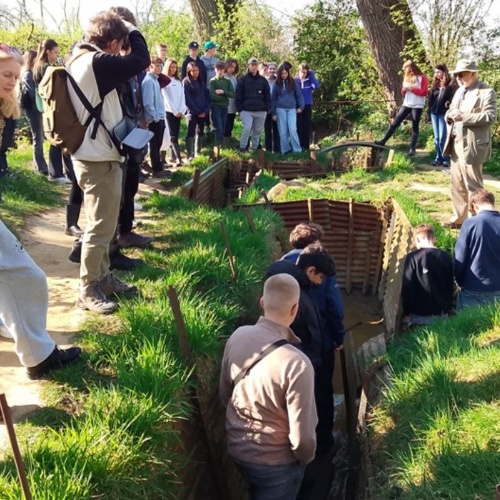
|
08 Apr 2025
On 3 April , 45 Year 10 students, and four staff members, set off for a three-day tour of the Battlefields of World War 1, mainly with a focus of visiting sites that were related to the medicine in the historic environment section of Paper 1 of the History GCSE.
|

|
04 Apr 2025
This week, three NLS teams have played in Netball finals, with Year 8 and Year 10 winning the District Cup and District Plate against Aylesford and Kenilworth teams. Our Year 7 did fantastically well and, in a closely fought game, were runners up to King’s High.
|
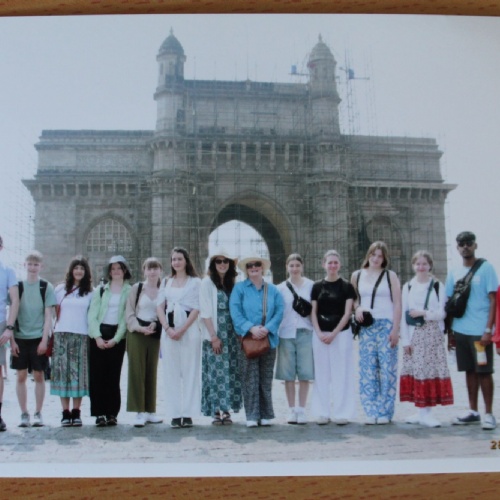
|
04 Apr 2025
This week we welcomed back into school our 12 students who visited our partner school in India from Sunday 23 March to Saturday 29 March. Mrs Harding our International Schools Coordinator accompanied the six year 9 and six year 12 students.
I had the pleasure of accompanying twelve of...
|
|
|
|
.JPG) |
07 Apr 2025
It has been another busy half term for Year 7 and all of us at North Leamington School are very proud of the progress they have made and the opportunities they have taken! It is always a joy to write to you all about everything we have been up to here in school.
|
|
|
 |
07 Apr 2025
This term has been a busy but productive term, filled with exciting learning experiences both in and out of the classroom which have allow the opportunity for real personal growth within the year group.
|
|
|
 |
07 Apr 2025
What an amazing term this has been for Year 9! I could not be any prouder of all our brilliant students. There were some outstanding achievements: 86% of our Year 9 students achieved more than 100 reward points, in our second round of assessments more students met or surpassed their...
|
|
|
 |
07 Apr 2025
As we reach the end of the Spring Term, I want to take a moment to express how incredibly proud I am of Year 10. This half term has been eventful, demanding, and filled with successes. From mock exams to inspiring trips, from the Race for Life event to our crucial Parents' and Revision Evenings...
|
|
|
 |
07 Apr 2025
As we reach the end of this eventful term, it is a great opportunity to reflect upon and celebrate the progress Year 11 students are making. Year 11 students have consistently demonstrated an outstanding attitude in preparing for their final GCSE exams. Whether through their engagement in lessons or...
|
|
|
 |
07 Apr 2025
What was that? It was another half-term zipping by and we now find ourselves approaching the ‘business end’ of the academic year – though we of course continue to offer a rich, diverse experience for your child! I trust they have had a good one and hope that this communication...
|
|
|
|
Students across all year groups have continued to achieve a fantastic number of reward points. This half term sees Blackdown having the highest number of Reward Points - Well Done.

It was Park who came out on top in our second attendance challenge when each student had the opportunity to make their attendance count and achieve 100% during the Challenge week. Congratulations to Park and to all students working to improve and maintain their attendance in school.
We are really proud of our students’ attendance which is well above the national average

With next term being just four weeks long, this gives us all a great opportunity to push for 100% attendance! We will therefore run our third challenge and, in this spirit on Friday 23 May we will be holding a Celebration Event for the Tutor Group with the highest attendance during the next half term. The highest attending Tutor Group from each year group will be invited, with their Form Tutor, to celebrate with some pizza.
We know how much attendance matters in school and we are looking forward to seeing which Tutor Groups will come out on top! Please do encourage your child to give their very best attendance next half term, it has a huge positive impact on their progress in school.
|
|
|
|
Year 13 students have successfully completed themes 1, 2, 3 and 4 and focusing on their pre-release topic for Paper 3, the Music Industry. Paper 3 research involves an in-depth analysis of current trends, markets, resource management, economic environment, competitive environment and global economy.
Students have been examining the significance of the music industry to the UK economy and the impact of AI in the music industry, as it grows further.
Year 12 students have continued to work well on theme 1.4 and have enjoyed learning and participating in mock interviews for the Human Resource management unit. Within this unit students have also been learning about the motivation theorists Maslow, Taylor, Herzberg and Mayo and presented interactive games to their peers as a revision strategy. This led to some thought-provoking discussions around non-financial and financial motivators in the modern workplace.

During their theme 2 studies, students have learnt about Resource Management, enhancing their understanding of Production, Quality and Capacity utilisation.
All students are encouraged to watch / listen to Business News to keep up to date and along with reading and researching entrepreneur autobiographies.
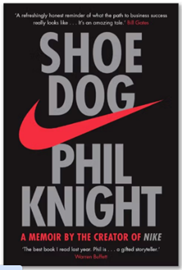  
Year 11 students have completed their last Topic 2.4 Making Financial Decisions this half term. Students have learnt some challenging concepts such as Gross Profit, Net Profit and Average Rate of Return. Interleaving and revision has been taking place, in order to prepare students for their Paper 1 Exam. All students have been emailed a copy of a revision timetable which they can edit to their chosen options. It is imperative that all students complete revision and practice questions from the workbook to check understanding and should have a copy of the Business Revision Guide and Workbook. All booklets and resources are on the Digital Learning Hub.
A reminder Intervention support sessions are offered on Wednesdays 3.15pm – 4pm.
Year 10 students have been enjoying learning about Topic 1.5 Understanding External Influences on Business. Students have been researching multinational businesses and the impact of unethical and environmental practices. They will start their International Schools Project next term when they research and gain an understanding of how our partner school in Mumbai are impacted by climate change and unethical practices of multinational companies.
It is imperative that all students complete revision and practice questions from the workbook to check understanding. All students should have a copy of the Business Revision Guide and Workbook. All booklets and resources are on the digital learning hub.
Intervention support sessions are also offered to Year 10 on a Tuesday 3.15pm – 4pm.
Year 9 Taster Lesson to support Option Choices
We have really enjoyed the eight taster sessions we have run for Year 9 to support them in making their option choices. We have discussed the specification and topics that students will learn over the GCSE course. Theme 1 concentrates on the key business concepts and skills involved in running a small business e.g. finance, liability, laws, tax, inflation, interest rates, exchange rates and government impact. Theme 2 examines how a business develops beyond the start-up phase. e.g. Marketing, Procurement/Logistics, Finance for growth and Human resources. It also considers the impact of the wider world e.g. Globalisation, Ethical Issues and Global Economy.
We also looked at future opportunities for students after completing Business GCSE. Wherever possible we use real-life local, national and global case studies to make it easier for students to relate to and develop their knowledge and application skills throughout the course. Both exam papers contain case studies that need to be applied to all questions in sections B & C therefore, literacy skills and comprehension are key to enable students to analysis and interpret data given. During the lesson students completed application and financial based tasks to give them a true understanding of a typical Business lesson. We hope the student found the taster lesson useful and enjoyable.
|
|
|
Key Stage 3
Key stage 3 support
There is a wide range of support available to support students with their computer science work. Most of these are available from home or on mobile devices. We have recently published a summary of these support options – which can be found on the Digital Learning Hub. These support options range from videos explaining the lesson content to screen readers to support learners with reading text on the screen. These support measures allow students to build up their confidence – particularly with their literacy skills.
Year 7
Year 7 have been looking at networks to understand what was needed to set up a Local Area Network (LAN), the benefits of using a LAN and how they connect to the internet. Students have also been introduced to the iDEA Award. This is an online scheme to encourage self-guided learning to supplement the computing curriculum and build workplace skills. Next half term they will be looking at how the binary number system works and why it is important in computing. Students have access at idea.org.uk using their normal email address and a password.
Year 8
Year 8 have working on Cyber Security. Cyber security is an ever-increasing concern. The UK needs skilled professionals to step up and become future heroes. Cyber Explorers, an initiative led by the UK Government, introduces a virtual world where learners discover how digital, computing and cyber security skills are integral to their future career paths. The learning programme credit rated by the Scottish Qualifications Authority (SQA), a testament to its quality and academic value. Students can gain a formal qualification using this site. It also lays a foundation for students to develop their skills further in year 9 and hopefully develop an interest that some can take into GCSE computer science in year 10.
Year 9
Year 9 have been looking at algorithms. Algorithms are the instructions used to solve a problem. They have been looking at the algorithms used to search and order data. This complements the Python programming they have been working on. Algorithmic thinking is useful in all areas of life – not just computing. Learning to think more abstractly and to decompose problems are important life skills in all areas of life.
Key Stage 4
All of our GCSE students have been investigating the role of women in computing. This involved looking at historical figures such as Ada Lovelace. In addition, they have looked at the important role of less obvious computer scientists like Florence Nightingale and how she used data and infographics to drive her famous changes in nursing care. More contemporary case studies are also studied to understand the active role women play in big tech companies worldwide.
Year 10 – GCSE Computer Science
In addition to their programming development, students have been investigating Networks and Protocols including topics such as LAN’s, WAN’s, Client Server vs Peer to Peer, Network Hardware, Topologies, Encryption, IP Addressing and MAC Addressing to name a few. Students will next investigate network threats and how to mitigate these threats.
Year 10 Additional Support
Our curriculum overview which can be found on the school website not only gives an overview of what topics are going to be taught but are especially useful is the optional homework and literacy sections on the right. Here you can find many resources to guide your child so they can work more independently at home. I would highly recommend the Oak National Academy links which are created by teachers and are pretty much online tutors, there are lessons, videos and worksheets/activities to get engaged with plus website links for NGfL and Python Principles which are specifically designed to help with programming techniques and develop skills in an interactive way.
Please also encourage your child to regularly access their Revise:CSUK platform. This has been purchased for them to aid recall, develop their literacy of key terminology and exam question technique. Please aim to get them onto the quizzes for approximately 15-20mins each evening to build confidence.
Year 11 – GCSE Computer Science
Students are continuing to review and recap on topics already covered in Years 9 and 10 and have developed their understanding of topics covered in Paper 1 of the final examination. We are now moving into covering Paper 2 topics in lessons.
Year 11 Additional Support
A reminder of the support and additional work that can be completed at home for your child in their final year of GCSE Computer Science.
Firstly, we will have a study support session running after school one day a week (Thursday) where students can work on their weaker areas and get additional support. We provide resources for students to access to help close gaps in learning. This started in January following their mock exam and is a ‘drop in’ style support session for most, but also additional specific targeted intervention for those that have not performed as expected in their mock. Parents have received an email requesting your child’s attendance, please see schedule below.
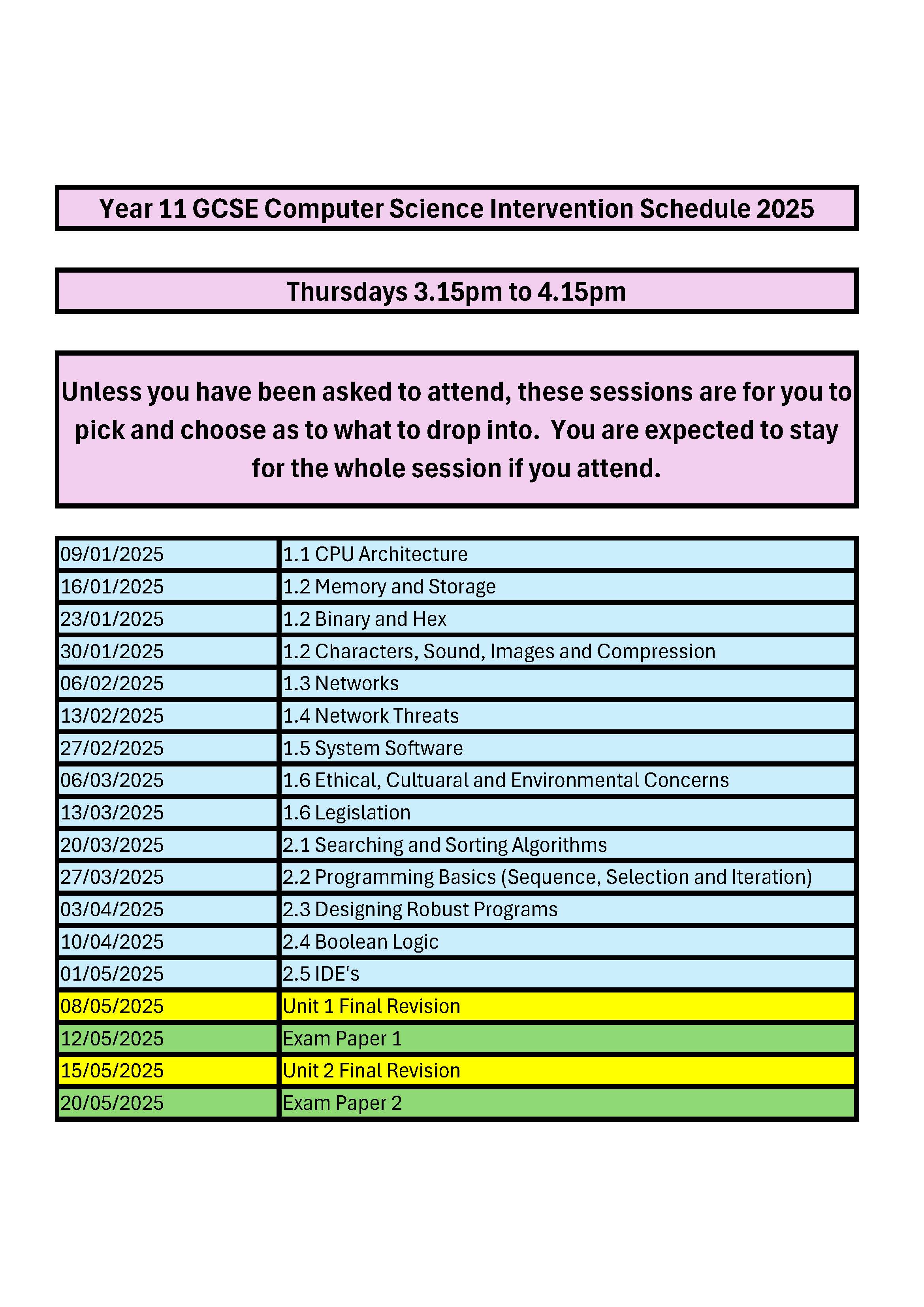
If the opportunity for your child to attend after school is not possible our curriculum overview on the school website not only gives an overview of what topics are going to be taught but especially useful is the optional homework and literacy sections on the right. Here you can find many resources to guide your child to so they can work more independently at home. I would highly recommend the Oak National Academy links which are created by teachers and are pretty much online tutors, there are lessons, videos and worksheets/activities to get engaged with plus website links for NGfL and Python Principles which are specifically designed to help with programming techniques and develop skills in an interactive way.
Suggested Revision Strategy
STEP 1
Google Craig and Dave YouTube Channel (Produced by award winning computer science teachers). Scroll down to OCR J277 – Start by watching the videos for Topic 1.1 Systems Architecture
STEP 2
Log on to your Smart Revise account. Use the topic filtering to only have 1.1 selected (remember to click Update Filter so it remembers your preferences. Now do 10 mins Quizzes, 10 mins Terms and 10 mins Advance
STEP 3
Now go back to the Craig and Dave YouTube Channel and watch the videos for Topic 1.2. You may want to split this into three sections (Memory & Storage / Binary & Hexadecimal / Characters, Sound, Images & Compression)
STEP 4
Now go back to Smart Revise. Use the topic filtering to add in 1.2 (leave 1.1 selected also). Now do 10 mins Quizzes, 10 mins Terms and 10 mins Advance.
STEP 5
Repeat Steps 3 and 4 by adding new topics each round. You may also need to increase the time spent on Quizzes, Terms and Advance by a few minutes each time you add topics.
FINALLY
Access Past Papers from the Digital Learning Hub – Subject Resources – Year 11 – Past Exam Papers. The mark schemes are also available. Write your answers on paper. Speak to your teacher about any queries you have with specific questions.
Key Stage 5
Year 12 – A Level Computer Science
Students have been learning about software and software development methodologies when creating major projects, compression, encryption, hashing, database design, networks and web technologies whilst also developing a programming solution to a problem using Python. Students are now moving onto data types and binary whilst also investigating the cultural, legal, ethical and environmental impacts of technology.
Year 13 – A Level Computer Science
Students have now finalised their programming projects and have received their marks for them. These marks contribute up to a maximum of 20% towards their overall grade. Alongside this, students have been developing their understanding of weaker areas of theory and getting ready for their final examinations.
Extra Support – GCSE and A Level
For all our GCSE & A Level students there is a continued promotion of using the Smart Revise platform (Years 11, 12 and 13) and Revise:CSUK (Year 10) to develop and enhance student’s ability to recall information and facts plus improve their use of literacy and keywords around the subject. Your support by encouraging your child to engage with this at home on a regular basis is much appreciated. Each student has their own personal login and can access the platform on any device through a web browser. At GCSE we also run an after-school support club once a week on Thursdays with Mr Sycamore, this is targeted support in the first half term, and offer Wednesdays for A Level support with Mr Sycamore.
iDEA Award
 We encourage all students to at least complete the Bronze award for iDEA. This is something students can access at home as well as in class, students have their own individual logins for these. We encourage all students to at least complete the Bronze award for iDEA. This is something students can access at home as well as in class, students have their own individual logins for these.
This half term we have seen James, Isabel, Mei and Abi achieve their Bronze certificate … well done!
These certificates are an invaluable addition to CV’s, references, College, University applications plus apprenticeships and are nationally recognised as evidence of IT literacy competency in the workplace.
Supporting Students At All Levels
We are currently promoting independence in computer science and have a variety of support mechanisms students can access during their lesson or even at home through the Digital Learning Hub. Some of these strategies are outlined in the image below:
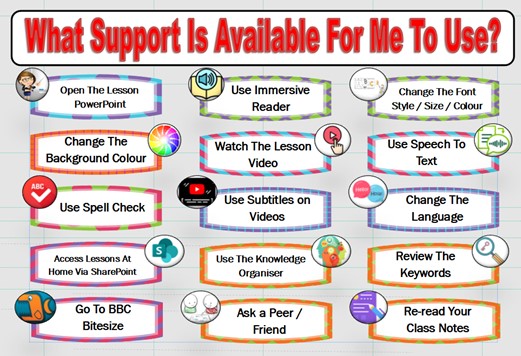
Computing Literacy
The computer science department now has a selection of fiction, non-fiction and coding books plus a range of revision guides available to loan from either the department itself or the school library to supplement homework and NLS literacy focus as a whole. We also have a large selection of computing magazines. We will be adding to this over the next year so, if you have any recommendations that you would like to see included, please email Mr Sycamore to add to the reading list. Some ideas to get started …
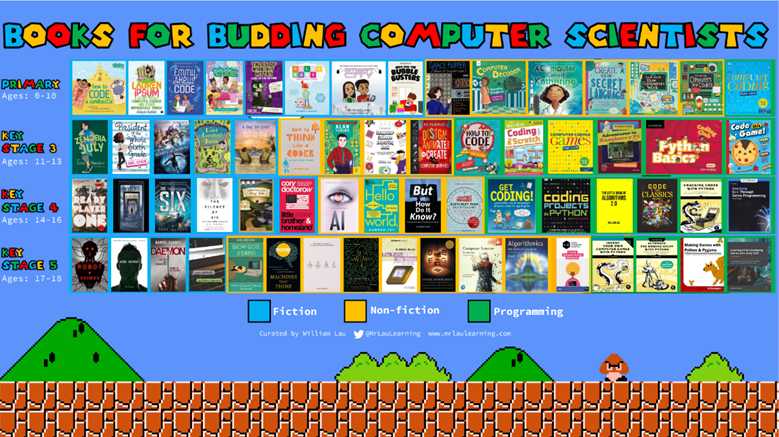
|
|
|
Year 7 Drama - Performing Text - The Grimm Tales
This unit of work focused on collaboration skills and how to work well in a group. Students had the opportunity to explore a script from The Grimm Tales (Hansel and Gretel) and explored line learning and interpreting the script using narration, physical theatre, chorus, puppets, and props.
Year 8 Drama - Documentary Theatre – Saw it in the Papers
This unit of work focused on collaboration skills and how to work well in a group. Students explored strategies to consider how theatre can convey a message to the audience and how theatre can persuade an audience to feel or think in a particular way. Students had the opportunity to create and develop a performance using narration, direct address, chorus, and placards based on the poem Saw it in the Papers. The final performance allowed students to ask the audience rhetorical questions and encourage them to think about issues linked to a tragic event.
Year 9 Drama - Exploring a Practitioner (Documentary Theatre)
This unit of work focused on collaboration skills and how to work well in a group. Students explored strategies to consider how theatre can convey a message to the audience and how theatre can persuade an audience to feel or think in a particular way. Students had the opportunity to create and develop a performance using narration, direct address, chorus, and placards based on a topic of their own choosing. The final performance allowed students to ask the audience rhetorical questions and encourage them to think about the themes and issues they had chosen. Stories ranged from true crime to historical events.
Year 10 GCSE Drama
Students enjoyed their visit to The Belgrade Theatre on Thursday 6 March, to watch William Shakespeare’s Romeo and Juliet – an innovative new production by Bristol Old Vic.

The production was created in collaboration with the local company That’s a Rap and featured a young cast. Director Corey Campbell augmented the production’s modern vision with song – mostly rap but also soul and R&B – alongside Shakespeare’s text.
The iambic pentameter was in place, but so were the beats, spoken word, and musical breakouts.
Year 11 GCSE Drama
Students successfully completed their Component 2 Performances, showcasing their monologues and duologues on Friday 7 March. They are now revising for their written exam on 8 May.
Component 3: Theatre Makers
Section A: An Inspector Calls by JB Priestley
This half term, students continued to revise Section A for the written exam. In the exam, students will be given an extract from the play and need to answer questions from the perspective of:
- Performer (4-mark and 6-mark question)
- Director (9-mark design focus, 12-mark performer focus)
- Designer (14-mark question)
Students used the checklists for each question to identify what they needed to revise. This included exploring the plot, characters, and themes and focusing on the Drama terminology needed in their written responses for both performers and designers. They also revised the context of when the play is set (1912) and the context of its first performance (1945) and had the opportunity to practice exam-style questions.
Section B: Live Theatre Evaluation
Students created a set of live theatre notes based on the National Theatre’s Life of Pi to aid their revision and prepare for the exam. They also had the opportunity to practice exam-style questions.
Revision resources are available on the Digital Learning Hub.
Year 13 A-Level Drama & Theatre
Year 13 Drama students performed their Component 2 performances on Wednesday 19 March. The group performed an extract from Pool (No Water) by Mark Ravenhill, which explores the experiences of a group of friends after one of them suffers a freak accident. The group stays to help their friend convalesce but cannot contain the jealousy that has haunted them about her successful life.
The class also performed monologues from A Streetcar Named Desire by Tennessee Williams and The Parking Lot by Adam Szymkowicz. They are now revising for their written exam on Monday 2 June.
Written Exam
- Section A: Live Theatre
- Section B: Colder than Here by Laura Wade (Performer and Designer Question)
- Section C: Lysistrata by Aristophanes (Director Question)
Enrichment in Drama - KS3 VIBE Drama Club Brings Shakespeare to Life!
The KS3 VIBE Drama Club has been buzzing with excitement with rehearsals in full swing for their upcoming production of A Midsummer Night’s Dream on 1 July 2025. This classic Shakespearean comedy is packed with magic, mischief, and mistaken identity, and our talented students are bringing it to life with energy and imagination.
Save the date – 1 July 2025 6:00pm – and join us for an unforgettable night of theatrical fun!
Tickets will be at no cost and available on ParentPay soon!
The Company - Thursdays after school (3:15-4:15pm)
This half term, The Company rehearsed the play Chatroom, a performance featuring complex characters and hard-hitting discussions that were both thought-provoking and eye-opening. Addressing topics such as mental health and peer pressure in an era of digital communication, the play aimed to evoke a range of emotions and invite audiences to question the morals that surround us in a chronically online society. Our enthusiastic and talented cast and designers embraced the themes of the play and attended the club each week, eager to tackle the challenges their characters faced and bring them to life. They demonstrated that a play is far more than just words in a script; it is an opportunity to share a performance containing valuable messages and to promote a story that so often goes unheard.
Enrichment Opportunity for Year 9 Drama students
We are really excited to be an ambassador school working with Highly Sprung Theatre and will be participating Physical Fellowship Festival. The Physical Fellowship Festival challenges young performers to engage in an intensive devising process, over two artist residency days in school with Highly Sprung artists, to create a 20 minute piece of thought-provoking and inspiring physical performance to showcase their talents as part of the festival week. The in-school workshops are on Thursday 19 June and Friday 20 June and the performance day at the Belgrade Theatre is on Thursday 26 June. Letters with further information about how to get a place on this project have been sent home via parent comms on Friday 28 March. For any further information, please contact Mrs Clarke pclarke@northleamington.co.uk .
|
|
|
Year 7
As we come to the end of another busy and rewarding term, we would like to celebrate the hard work and achievements of our Year 7 students in English.
Students have completed their studies of A Monster Calls. Using their understanding of the text, they drew inspiration to craft their own creative writing pieces, focusing on vivid descriptions and compelling narratives exploring themes of destruction. The creativity and engagement shown in these tasks were truly commendable, with students demonstrating their growing confidence in using literary techniques to bring their writing to life.
To conclude our study of the novel, students had the opportunity to watch the film adaptation of A Monster Calls. This was a fantastic way to consolidate their learning, allowing them to reflect on how the story was brought to life on screen; it was a wonderful way to round off this unit.
Students have also participated in an exciting international collaboration as part of the International Schools Project with our partner school in Mumbai. This involved reading stories written by their peers overseas and taking on the creative challenge of writing their own endings. This experience provided a fantastic opportunity for cultural exchange and a sense of global connection through storytelling.
In the final week of term, students began exploring poetry related to identity and culture. They made a fantastic start to this new unit, demonstrating enthusiasm and thoughtful engagement with the themes. We are looking forward to building on this work when we return next term.
Year 8
Following an in-depth study of Shakespeare’s The Tempest, our Year 8 students transitioned into an exciting creative writing module, focusing on the development of dystopian settings. Students engaged with a diverse selection of dystopian literature extracts, using them as inspiration to deepen their understanding of the genre and refine their own writing skills.
Building on their analysis of these texts, students worked with various creative stimuli to generate ideas, draft their narratives, and develop their writing through a cycle of editing and refinement. This process allowed them to craft compelling and imaginative pieces, culminating in some truly impressive final works that showcased their creativity and growth as writers.
As we concluded the creative writing module, we embarked on the study of Long Way Down by Jason Reynolds, an innovative novel written in verse. We are eager to see how students apply their previously acquired skills in textual analysis, language appreciation, and storytelling as they engage with this powerful and thought-provoking book. The coming weeks promise insightful discussions and a deeper exploration of the novel’s themes and structure.
We are incredibly proud of the enthusiasm and dedication students have demonstrated so far and look forward to seeing their continued progress throughout this term.
Year 9
Year 9 students have demonstrated great enthusiasm and engagement in their English studies this term. After an initial introduction to GCSE Media, they transitioned into developing their language skills through creative writing. This unit focused on crafting narratives and exploring descriptions of conflict, with inspiration drawn from Shakespeare’s Romeo and Juliet. By staying on trend with this timeless text, students delved into the themes of love and conflict, which informed their own writing pieces.
Students progressed well refining their use of ambitious vocabulary, figurative language, and structural techniques. Their ability to incorporate these elements effectively into their work showcased their growing confidence as writers. The final assessments were a testament to their hard work and creativity, with many students producing impressive pieces that demonstrated a strong foundation for their future English Language studies.
During the past two weeks, we have begun our study of An Inspector Calls, which will continue into the next term. Students are engaging with the plot, characters, historical context, and key themes of the play. This marks an exciting new phase in their learning journey, as they develop their analytical skills and deepen their understanding of dramatic texts.
A fantastic start has been made, and to maintain this momentum, we strongly encourage students to independently consolidate their learning. Reviewing class notes, engaging in discussions, and making use of the many revision tools available on the Digital Learning Hub will ensure they feel secure in their knowledge over the next two and a half years as they progress toward their GCSEs. We are incredibly proud of our Year 9 cohort and look forward to seeing their continued success in the coming term.
Year 10
This term, Year 10 students shifted their focus from Language Paper 1 and returned to the study of literature. They began their exploration of one of Shakespeare’s iconic plays, either Romeo and Juliet or Macbeth.
Students quickly developed their understanding of the text, engaging in thorough reading and in-depth discussions on key themes and characters. Alongside this, they have been refining their analytical writing skills, a crucial aspect of their preparation for next year’s GCSE examinations. Through structured analysis and essay practice, students have been building their confidence in crafting well-supported, critical responses.
As always, we encourage students to consolidate their learning through a variety of revision techniques. Engaging with quizzes on Seneca, creating revision posters focusing on characters, themes, or plot, and practising the technique of exploding quotations all contribute to a deeper understanding of the texts and their underlying meanings.
Following the completion of their literature studies, students will revisit the Language Paper 1 module. This review is particularly important as they will sit this paper for their progression exams in June. To ensure they are well-prepared, students are encouraged to practice past paper questions, focusing on their understanding of language methods and the structure of each question. Additional support is available on the school’s Digital Learning Hub, where a variety of tasks and activities can be accessed and reviewed by class teachers.
We appreciate the continued support from parents and carers in helping students maintain their engagement with both literature and language studies. With consistent effort and structured revision, we are confident that students will be well-equipped for their upcoming assessments and future GCSE success.
Year 11
Year 11 students have worked diligently on their Language Paper 2 units, each class has transitioned into a more tailored revision approach, ensuring that their learning is suited to their specific needs and areas for development.
In preparation for their final exams, students have systematically revisited their literature texts and refined their analytical skills, reinforcing their ability to approach each exam with confidence. Alongside this, they have engaged in focused revision of key language techniques, ensuring they are fully equipped with the necessary skills for success.
As we approach the final stretch, we are encouraging all students to continue to take ownership of their learning by reflecting on their understanding and identifying any areas that require further attention. Personalising their revision will be essential in bridging any remaining gaps and consolidating their knowledge.
We would like to take this opportunity to wish all our students the very best in their final weeks at NLS. Their hard work and perseverance have been truly commendable, and we are excited to see them succeed in their exams. Good luck, Year 11!
Year 12
This term, our Year 12 Language and Literature students have completed their studies of the Paris Anthology and have been engaged in the analysis and reading of The Handmaid’s Tale. Their exploration of these texts has allowed them to develop strong analytical skills and a deeper understanding of both fictional and non-fictional representations of the world around them.
Literature students have continued their study of Othello in preparation for Paper 1 of their A-Level exams. Alongside this, they have also completed their reading and analysis of The First Casualty, which marks the final text for Paper 2. Their commitment to these challenging texts has been commendable, and their engagement in class discussions and written work has demonstrated great progress.
Looking ahead to next term, Year 12 will begin their study of Love Through the Ages poetry (Pre-1900), which will provide them with valuable insights into historical literary themes and contexts. They will also continue their study of Othello before embarking on an exciting new journey with The Great Gatsby. We are confident that the next term will be both enriching and stimulating for our students.
Year 13
Year 13 students have completed their NEA coursework. The pieces are marked and moderated before being sent to the exam board. Their hard work and dedication to their independent projects have been truly impressive, and we look forward to seeing their efforts reflected in their results.
With exams just around the corner, revision ensures they are well-prepared for the challenges ahead. As this is the final bulletin before their exams, we would like to take this opportunity to wish all our Year 13 students the very best of luck. We are incredibly proud of their achievements and dedication, and we have no doubt that they will go on to achieve great things in their future endeavours.
A reminder of the revision schedule for A Level English Language and Literature students.
|
Date
|
Theme
|
|
25 February 2025
|
Language levels and terminology
|
|
4 March 2025
|
Creation of a thesis statement BIG PICTURE response
|
|
11 March 2025
|
Approaching the Paris question Paper 1 Section A
|
|
18 March 2025
|
Approaching the HMT question Paper 1 Section B
|
|
25 March 2025
|
Approaching the Duffy question Paper 1 Section C
|
|
1 April 2025
|
Approaching the TKR recast question Paper 2 Section A
|
|
8 April 2025
|
Approaching the TKR commentary question Paper 2 Section A
|
|
29 April 2025
|
Approaching the ASND question Paper 2 Section B
|
|
6 May 2025
|
Paper 1 Revision – Preparation for exam
|
|
13 May 2025
|
Paper 1 Revision – Preparation for exam
|
|
14 May 2025
|
Paper 1 Telling Stories Exam PM
|
|
20 May 2025
|
Paper 2 Revision – Preparation for exam
|
|
22 May 2025
|
Paper 2 Exploring Conflict AM
|
|
|
|
Year 10 have been working on their NEAs, planning the narrative to their action films and should be using the good weather to their advantage by organising their friends and getting those all important photographs taken.
Year 11 are undertaking revision in their media lessons – students have recently had revision sessions on the assessed music videos of Taylor Swift, Justin Bieber and TLC. Revision is being dictated by students' needs and will include revisiting Fortnite, The Archers and the newspaper industry.
Year 12 have also started to work on their NEAs. Students have a lot of freedom and are working in lessons to plan music videos, fashion magazines and website depending on their personal interests. Outside of the NEA, students are immersed in the hyperreal world of San Junipero from Black Mirror. Ask them about simulacra’s and prepare for your mind to be blown!
Year 13 are finishing off their final texts of The Big Issue and Vogue and using their last few weeks in school to revise Assassins Creed and George’s Podcast before heading off to study leave. Rest assured that Miss Norman will still be available in school during this time to guide students with their revision whilst their exams are taking place.
|
|
|
Year 7
Our Year 7s have had a fantastic term exploring different environments. This half term they have explored polar environments learning all about Captain Scott's adventures and how to survive in the Arctic. They excelled in their debate skills discussing how the Arctic should be managed.
Year 8
Our Year 8s have developed their geographical thinking making links across topics exploring tectonic and tourism. They have now moved onto Changing Nations and are beginning to learn about the Geography of many different Countries and how they are changing and adapting. They have loved learning about different places and cultures.
Year 9
Our Year 9s have learnt all about different urban environments. They have explored how Mumbai is similar and different to the UK. They have learnt all about the different opportunities and challenges in a growing city where one person every minute migrates to Mumbai. This has tied in really well with our visit to our partner school where some of our Year 9s have actually got to see these opportunities and challenges first hand. It has been fantastic to hear all about their experiences.
Year 10 and 11
Year 10 have been exploring the beautiful coastal areas of the UK and Year 11 are busy looking at a pre-release booklet sent by the exam board all about energy and a proposal to develop tidal power in the estuary of Morecambe, we wish them all the very best in the upcoming exams.
Year 12
In February, Year 12 enjoyed having two visiting speakers from the Leamington Society, including the Mayor of Whitnash. The talk explained how the Leamington Society, as an example of a community group, shapes a town. The students listened brilliantly and asked insightful questions. They found it really helpful thinking through how the Leamington Society has shaped Leamington’s identity and learning about the different ways that they do this.
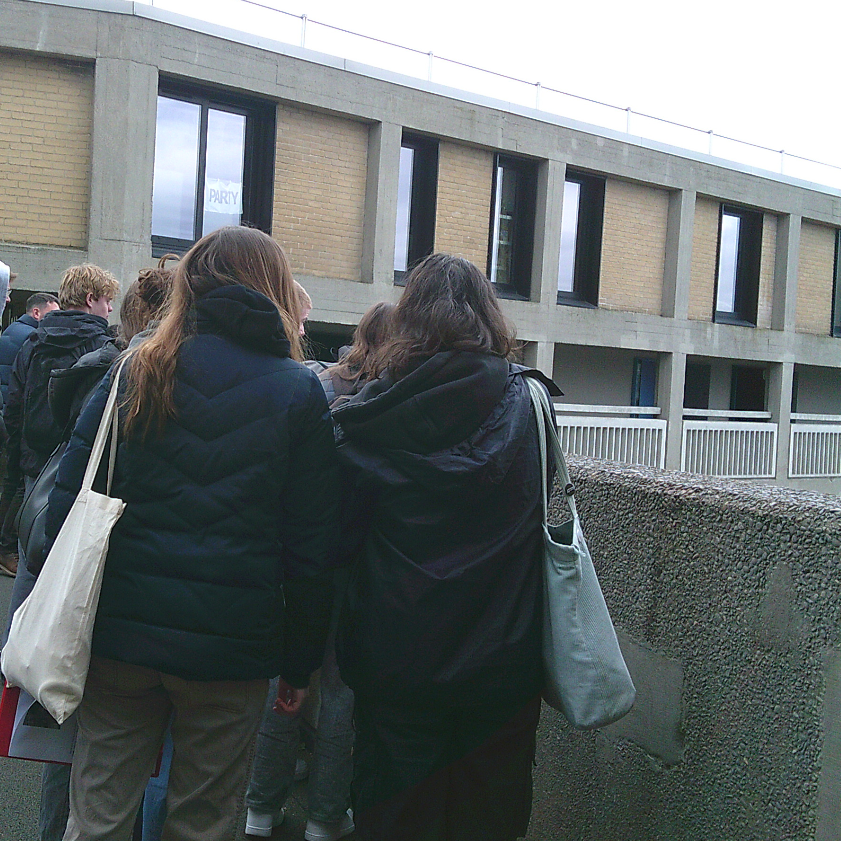 Year 12 also visited the city of Sheffield in March and carried out fieldwork in an area called Park Hill. Year 12 also visited the city of Sheffield in March and carried out fieldwork in an area called Park Hill.
This is a listed housing estate that has been regenerated by Urban Splash and our students had a guided tour around the site as well as going into one of the flats.
Year 13
Year 13 have been busy completing the last two topics, which are hazards and disease dilemmas. They are preparing very well for the summer exams through the completion of weekly revision questions.
|
|
|
Year 10 have completed their first internal assessment which is part of Component 1: Travel and Tourism Organisations and Destinations and accounts for 30% of their overall grade. Well done.
They have now moved onto Component 2 which is examining How Customer Needs are Met in Travel and Tourism and have been investigating how organisations use market research to identify travel and tourism trends and identify customer needs and preferences. They applied their understanding by exploring how specific needs are met by organisations and how travel planning meets customer needs and preferences.
Students in Year 11 have now completed all internal assessments of their BTEC course (60% total grade) and this term have been preparing for Component 3, the exam component. The focus is about the influences on global tourism, such as media, natural and economic factors and approaches such as sustainable tourism. All learning aims (A, B and C) for this component will be assessed in one exam worth 40%, which will be a 2-hour exam for 60 marks on 2 May.
We wish them all the very best with this exam. Revision resources and specimen assessment resources are accessible and highly recommended on the Digital Learning Hub.
|
|
|
Year 12 students have now completed the three learning aims of their examination unit for Unit 1: Human Lifespan Development. We finished by analysing the theories of ageing including Social disengagement theory and Activity theory and explored the societal impact of an ageing society.
To support their learning here, we examined the case studies put forward by Dan Buettner in Netflix documentary, ‘Live to 100 – the Secrets of the Blue Zones’ and prophesised what retirement might look like 30 years from now – perhaps more of a hybrid of work and leisure as a result of an ageing population. Refreshingly, the students also concluded that this might be a preferable option to avoid some of the negative aspects of retirement on our health and wellbeing…A topic that can be debated at home!

We have completed structured revision, covering the key content and applying their knowledge to practise questions, with one ten marker each week, a full paper and practise questions as a group each lesson. We are using a range of revision techniques, including visual techniques – transforming information into storyboards, revision stations sorting information and distilling the key information for the 11 key theories the students need to know for their exam. They have fully engaged with these activities, working collaboratively with one another and drawing on their knowledge. Some examples of these revision lessons below.
The students will be completing the examination for this unit on Monday 12 May 2025. They have revision materials and know where to access full papers on the Digital Learning Hub during the Easter break. For the coursework element, the students have one further ‘learning aim’ to write up in their coursework component and are checking through existing work, ensuring references are used correctly and checking for any typing errors – excellent skills practise for the future.
Year 11 students did a fantastic job of preparing for Component 3 - Health and Wellbeing which looked at the factors affecting development and the designing of health and wellbeing plan and potential obstacles when completing this plan. The exam is scheduled for Tuesday 6 May, after the bank holiday weekend. To support students with this final component of their Health and Social Care course worth 40% revision resources have been added to G4S. In addition revision sessions have run on Tuesday after school with one final revision session scheduled for Tuesday 29 April 15:15-16:00pm.
Year 10 have been doing a fantastic job of completing their Component 1: Human Lifespan Development. They have completed their first Pearson Set Assignment which comprised four tasks and took a minimum of six hours to complete. Students have been looking at how individuals grow and develop physically, intellectually, emotionally and socially across the life stages. In addition, they have been exploring how life events can impact development and the services that can be access to support individuals going through different life events.
Year 9 Taster Lessons
We have been delighted to welcome Year 9 students to our Health & Social Care Taster lessons in support of them making their Option choices. We were able to give an overview of how the course relates to them, what Health & Social Care is all about, followed by some interactive tasks.
For the taster lesson we focused on one unit of the course – Human Lifespan Development - which looks at different life stages and what influences development at each stage, along with what Health Wellbeing is and the PIES tool used by practioners to help categorise and understand what development happens through the life stage.
The students enjoyed interactive sessions where they were tasked with:
- Identifying which life stages certain changes occur in and the type of change
- Identify which motor skills are being developed
- Justifying how the infant is using the identified motor skill- e.g. gripping the handle
Students then moved onto a task where, working collaboratively, they imagined they were working as part of a toy manufacturing company with a brief to design and create a new toy to be marketed to infants between the ages of 0-2 years.
Brief 1 was to support the physical developmental needs of Infants - focusing on their fine and gross motor skill development.
Brief 2 was to design and create a toy that supports the physical developmental needs of Infants, which also considers their other PIES developmental needs (Intellectually, Emotionally & Socially.)
We really enjoyed seeing Year 9s working together and they created some fantastic new toys including a sensory matt and a sensory book.
|
|
|
Year 7 are concluding the problems faced by medieval Kings, including the Black Death and the Peasants Revolt. They will move onto the Crusades, the War of the Roses before focusing on the Renaissance, with Florence and Leonardo da Vinci as a focus.
Year 8 have begun looking at the social and political reform of the industrial period from 1750 to 1900. Within this we cover the transatlantic slave trade, child labour, the 1832 Reform Act leading to the expansion of the franchise and public health reform with legislation introduced in 1848 and 1875.
Year 9 are looking at key events from World War II, such as the retreat from Dunkirk, the impact of evacuation and the arguments for and against the use of the atomic bomb to force a Japanese surrender. After Easter, Year 9 will spend the remainder of the year looking at the British Empire. Our focus is on Britain’s relationship with India and Ireland up to independence and we then focus on migration into Britain after World War II, looking at the impact and experiences of people from the West Indies and the Indian subcontinent.
Year 10 continue to work through Paper 2 of their GCSE. We have finished Early Elizabethan England, 1558-88 and are working on International Relations and the Cold War, which completes the second half of Paper 2. Year 10 will sit a full Paper 1 mock exam in June, with questions on medicine through time and medical provision in the trenches of World War I.
We had a fantastic trip, with those Year 10s able to join us, to the trenches, museums and memorials of World War I in France and Belgium, which supports section A of Paper 1, looking at medical provision in the trenches during World War I. You can see more details and pictures in the news secion at the beginning of this Bulletin
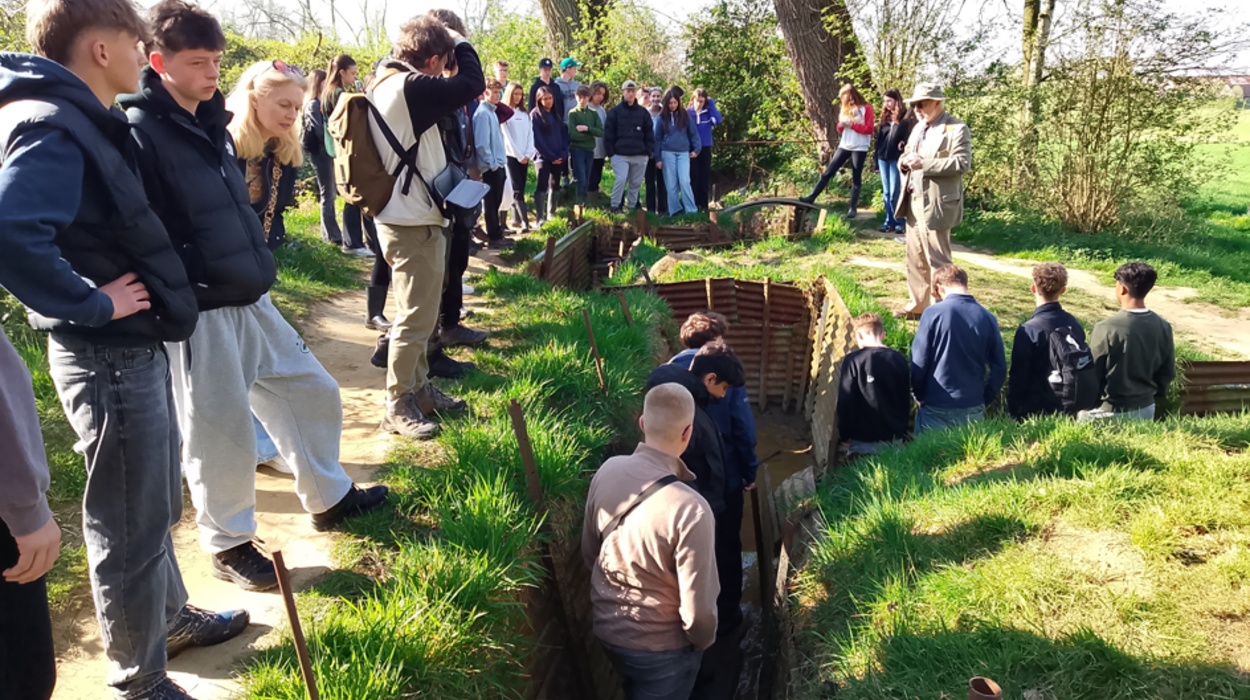 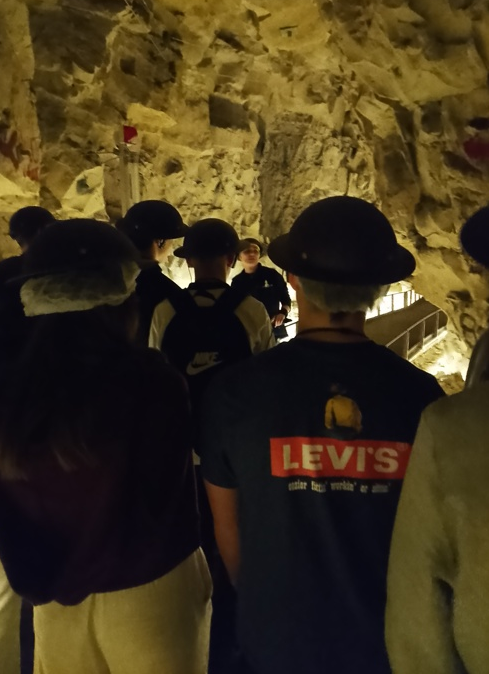
 

Good luck to Year 11 who begin their History GCSE with Paper 1 on May 16, Paper 2 on June 5 and Paper 3 on June 10. If students need any support during this period their teachers will be available either in their classrooms or via email.
Year 12 Historians are working through Paper 1 and 2 – Britain, 1918-97 and the USA, 1955-92 – which is their focus for the year.
Good luck to Year 13 Historians who begin their A level History with Paper 1 on May 23, Paper 2 on June 6 and Paper 3 on June 12.
If students need any support during this period their teachers will be available either in their classrooms or via email.
|
|
|
Year 12 Politics students are working through Paper 1 and Paper 2 – British Politics and British Government – which is their focus for the year. It is important that students keep abreast of contemporary political events by reading broadsheet newspapers, following politics programmes on TV and radio and listening to the podcasts that have been suggested to them in class.
The same applies to year 13 to enable them to comment on contemporary events in their June exams, even if the information they read is published on the same day as the exam.
On that note, good luck to the Year 13 Politics students who begin their A level Politics with Paper 1 on May 20, Paper 2 on June 5 and Paper 3 on June 10.
f students need any support during this period their teachers will be available either in their classrooms or via email.
|
|
|
Our year 7 students continue to make fantastic progress during their maths lessons. The classroom is filled with enthusiasm, and the enjoyment of learning Maths. Recently, students have been learning how to correctly use a scientific calculator and all its useful functions. It is important that all students have a scientific calculator as part of their school equipment and bring this to school every day.
End of year assessments are fast approaching and to ensure students are fully prepared they should begin their revision using the Module Instruction Sheets uploaded to G4S and their exercise books.
If students require assistance or support with revision and or homework we run a homework space for all year groups on a Tuesday after school until 4pm in S206. We are continually impressed by their dedication and strong work ethic. Keep up the great work!
Our year 8 students continue to work as hard as ever. Since the beginning of the term we have been learning about Geometry, Fractions & Percentages and Probability. More recently, students have been learning and developing their calculator skills. It is important that all students have access to calculators and that they will be brought to every lesson. We are very pleased with their positive attitude and effort, and as the end-of-year exams approach, they should start focusing on revision and practice of all topics and skills they have learnt this year. If students require assistance or support with revision and or homework we run a homework space for all year groups on a Tuesday after school until 4pm in S206. Keep up the great work!
Our year 9 students continue to make great progress. We have moved on from Algebra and have been focusing on Probability. Students have recently started a Mensuration module, where they will learn a range of new content and formula. Including topics such as Trigonometry. With end-of-year exams approaching, revision will be essential. Students should review their work carefully and ask questions to address any gaps in their learning. Keep up the hard work!
Year 10 continue to make very encouraging progress. We are really pleased with their work so far and their commitment to learning. We are now reaching the point where remembering and mixing all previously learnt topics is becoming essential and we are sure the Y10’s will rise to the challenge.
Year 10 will sit their end of Year Assessment in the theatre under exam conditions, sitting one Maths calculator paper. Therefore, it is essential they have a scientific calculator as part of their school equipment.
We are extremely proud of our Year 10 students who took part in an external event called the Maths Feast at Myton School. The Maths Feast is a competition between school solving Maths problems. The students did very well, thoroughly enjoyed the event and were a credit to the school.
Year 11 are fast approaching their final GCSE Maths examinations and continue to show good discipline and attitude. We are really pleased with their progress and revision shown. To ensure good learning continues, students are strongly encouraged to attend our after school revision sessions to consolidate key topics which are run on Thursdays from 3.15pm – 4pm. Students should also use the website Maths Genie to ensure they see and practice as many past papers and topics as possible.
This is the key time to bring everything together – I’m sure the year 11’s will rise to the challenge and chase every single mark when they complete their final exams in the summer. We wish them the best of luck.
Year 12 have completed all of their AS content of their course, and are practising topics based on their mock papers. They will be looking at completing a full set of AS papers soon to assess their progress through the year, hopefully these will show good progress to reward their efforts!
Year 13 have now finally finished the course and are practising on topics arising from their mock papers, as well as completing past papers and shadow papers, to put themselves in the best position to achieve their desired grades. They are putting a lot of work into topics they have identified from their mock PLCs, and attendance to after school classes has picked up a lot as well, hopefully this will help to make a difference!
|
|
|
German

Year 7 German students have worked well this half term and have studied the topic of free time. They have become very confident in forming present tense verbs in different verb forms and formed opinions about sports and hobbies, developing their answers by providing reasons.
We have completed our first Spelling Bee competition. The Foreign Language Spelling Bee is a competition to practise and improve vocabulary, spelling and memory skills. Students had to translate the words from English and spell them in the target language. Students were entered according to their target band Well done to all taking part and to the winners of this competition.
Well done Year 8 – another very successful half term. We have studied the imperfect past tense and the perfect in German. Students have really got to grips with the word order of the perfect tense and have been able to form this tense using a variety of different verb forms. On a lighter note, we have also looked at Easter in Germany and understood their traditions at this time of the year. Frohe Ostern! Osterglocken klingen, die Osterhasen springen!
Year 9 German students have worked exceptionally well this half term and have made fantastic progress in all their assessments. Most students are working on or above their target band. Really well done! We were so pleased with the results and the progress you have made since September. We have focused on many grammatical rules and topics, which appear at GCSE level and they have handled these complex structures extremely well. We hope that many will opt for GCSE German. We have also looked at how German is used in the working world and the benefits of learning a language.
Year 10 German students have made amazing progress this half term and we have been so pleased with their dedication and progress. We have looked at many examples for the new GCSE speaking examination. They have successfully completed role-play, read aloud and picture tasks. Well done! Students have really focused on what is required and applied a variety of tenses, opinions and reasons, as well as target grade grammatical structures to their work. We have also looked at Easter in Germany as a big reward for all their hard work. Ein Osterei – das liegt im Nest. Wir wünschen Euch ein frohes Fest!
Year 11 German students have worked diligently this half term. They have really focused well on the feedback from a recent mock speaking examination and have now completed their actual GCSE speaking unit. Well done! We have also focused on revision of Year 10 and 11 topics and looked at exam techniques for listening, reading and writing, which will be completed soon after the Easter break. Keep going, you can do this!
French

Year 7 French students have worked incredibly hard this half term studying the topic of sport and free time. They have learnt a lot of new vocabulary and are able to describe which sports they ‘play’ and ‘do’ and give detailed opinions.
Students have also become confident using present tense verbs in different forms, including he/she and we. Students have completed their first Spelling Bee competition which will continue after the Easter break. Students had to translate the words from English and spell them in the target language. Well done to all taking part and to the winners of this competition.
Year 8s students have really worked well this half term to increase their range of language. Students studied the near future tense in their previous module, and more recently have learnt the perfect tense of regular –er verbs in its different forms. With this under their belt, students are now able to produce language in three different time frames – a key skill moving forwards to year 9 and GCSE French. At the end of term, students looked at Easter celebrations in the Francophone world and the key differences with the UK.
Year 9s have been rapidly improving their language skills and started the final Key Stage 3 module – Le Monde est Petit. So far, they have learnt how to use modal verbs to describe their region in detail and discuss what chores they have to do around the house. In the final weeks of this term, Year 9s had their options evening. We were really pleased to see so much interest in the French GCSE and look forward to seeing some familiar faces next year in Year 10.
Year 10 continue to work hard and have made great headway through content this term, completing Module 3 (school and future plans) and beginning Module 4 (staying healthy physically and mentally). In Module 3, students have recapped the perfect tense of regular verbs and were introduced to irregular verbs in order to describe their progress at school. Module 3 also saw the introduction of the imperfect tense, which students applied to discuss what they used to be like when they were younger. During Module 4, students have been reintroduced to reflexive verbs to describe how they are feeling, and have used the imperative form to give advice.
Year 11 are nearing the end of their GCSE French journey and have been working tirelessly in the lead up to their final exams. In the last few weeks of term, students did their final GCSE speaking exams, completing 25% of the course. The dedication, time and effort that students put into these exams has been truly astounding and I have no doubt that we will see some fantastic results in the summer. Having completed the last module of the GCSE course, lessons have focussed on revision as we head towards the Reading, Listening and Writing exams in May and June. Well done Year 11, just one last little push!
Spanish

As we reach the end of the term, I want to take a moment to congratulate our Year 11 students on their dedication and hard work in Spanish. We have successfully completed the syllabus, and I was truly impressed by their performance in the speaking examination—well done!
Now, we turn our focus to the remaining exams:
📌 Listening & Reading – 10 June
📌 Writing – 17 June
I encourage students to continue working hard and making full use of their revision time to ensure they are fully prepared. Their commitment so far has been fantastic, and I am confident they will achieve great results.
¡Buena suerte, Año 11!
|
|
|
Year 7: Keyboard Skills and Rhythm in Music
Keyboard Skills (Mr Noakes)
This unit of work focuses on performing written music. Students develop their practical music-making and keyboard skills alongside their understanding of notated parts. Notated music challenges students to consider note placement, duration and pitch to reproduce famous musical melodies, whilst developing their keyboard and collaborative skills. Students have been encouraged to perform to the class for assessments and build confidence through shared music-making experiences. Resources provided offer students of all musical ability the opportunity to access the curriculum and develop musical understanding.
Rhythm in Music (Mr McIntyre)
This unit of work focuses on performing percussive Samba-style rhythms using a variety of percussion instruments. Students have developed knowledge about Samba Batucada alongside their practical music-making, collaborative and listening skills. They have performed ‘class samba’ compositions and creating their own rhythmic pieces in small groups. Students have been encouraged to perform to the class for assessments and build confidence through shared music-making experiences. Resources provided offer students of all musical ability the opportunity to access the curriculum and develop musical understanding.
Year 8: Keyboard Duets (Mr Noakes)
This unit of work focuses on performing written music. Students have been developing their collaborative music-making skills and keyboard skills. Notated music in two parts challenges students to consider the importance of listening, timing and note placement to reproduce famous musical melodies and harmonies with their partner. Students are encouraged to perform to the class for assessments and build confidence through shared music-making experiences. Resources provided to offer students of all musical ability the opportunity to access the curriculum and develop musical understanding.
Year 8: Sound and Animation (Mr McIntyre)
This unit of work focuses on composing, sequencing and editing sound for a short, animated film clip. Students have been exploring the use of musical devices to create expressive musical motifs and effects to enhance the emotion and action happening in different scenes of the film. There has been an emphasis on attention to detail and timing alongside developing editing and sequencing skills to produce an effective and appropriate soundtrack for the scenes throughout the film. As preparation the students watched and analysed cartoons and animated film clips from different eras to develop their appreciation of music and sound in film.
Year 9: Musical Styles
Performing/Composing/Sequencing
Composing & Sequencing (Mr McIntyre)
This unit of work focuses on students collaborating in pairs or small groups to compose and produce three musical examples that demonstrate an understanding of the key features associated with Rock’n’roll, Reggae and Latin music. Students used their knowledge of sequencing software to compose and record examples of these musical styles. To broaden their understanding of the instrumentation, composition techniques, structure and features associated with different types of music, students have been encouraged to analyse a range of pieces through listening tasks, identifying the key terms and musical devices used to create music in a certain style.
Performing (Mr Noakes)
This unit of work focuses on students collaborating in pairs or small groups to perform examples and elements of Rock’n’roll, Reggae and Latin music. Students are encouraged to develop their practical, technical and collaborative performance skills, practising and performing challenging notated music. They have also been encouraged to consider the three genres and apply genre-specific stylistic or musical features to their performance. Students are encouraged to demonstrate a disciplined approach, review their work, monitor progress and identify areas for development.
Year 10: BTEC Music Level 2: Component 1
Students have been working towards the completion of Component 1 of their course. During these components, students have learnt a range of musical styles and will be tasked with performing, reproducing and composing pieces to demonstrate their practical/instrumental/music-making skills. Alongside their practical work students have produced written analysis and reviews to demonstrate their historical, contextual and theoretical knowledge.
Year 11: BTEC Music Level 2: Component 3
Students have been working towards their PSA for Component 3. This unit is focused on students developing and demonstrating their music composing skills using a combination of music software tools, live techniques and instrumental skills to explore, compose and realise their creative ideas. They are tasked with planning, preparing and recreating a popular piece of music in a contrasting style, providing written analysis/reviews to record their progress and demonstrate their knowledge.
Year 12: BTEC Music Level 3: Unit 1
Students in Year 12 have been developing their knowledge of music theory by completing performing and composing tasks. They continue to build on their current understanding of western musical traditions and notation with a view to consolidating their knowledge in the form of a presentation and musical examples for assessment. Students have also started to explore job roles, careers and business plans for their Unit 2 examination in the Summer term.
Year 13: BTEC Music Level 3: Units 40 and 33
Year 13 have recently completed their Unit 30 solo recitals. These were based on a programme of music that the students had compiled to demonstrate their individual performance skills in a 20-minute recital. There were a variety of styles and skills on show, all performed to an excellent standard.
Extra-Curricular
Wind Band: Tuesdays 3:30pm – 4:30pm
Music Club: Wednesdays 3:20pm – 4:20pm
Steel Band: Wednesdays 3:30pm – 4:30pm
Pop Choir: Thursdays 3:30pm – 4:30pm
String Ensemble: Fridays 3:30pm – 4:30pm
Wind Band Performances
We are very proud to share news about our Wind Band and their recording for the Heart of England Digital Festival, which was broadcast on Thursday 12 March, on the Heart of England YouTube channel.
The Wind Band also performed a wonderful concert of music from Stage and Screen at St. John’s Church in Leamington on Wednesday 2 April. The whole evening was a celebratory and fitting send-off for our Y11 and Y13 pupils for one of their final performances with the band (at least for this year). We would like to express our thanks to Mr Howe for his commitment to providing our students valuable opportunities to perform musical repertoire to audiences at events like this.
|
|
|
The start of Spring 2 term means a change in activities in PE lessons, with boys in Key Stage 3 doing Hockey, Handball, Gymnastics, Dance, and Table tennis and for the first time, Netball. While the Girls in Key Stage 3 have enjoyed Basketball, Badminton, Rugby and Health Related Fitness.
Key Stage 4 boys moved on to Netball, Badminton and Fitness, with the Girls doing Basketball, Football and Health Related Fitness.
Spring 2 term sees a busy time for the examination courses. Year 13 A-level students completed their Evaluation and Analysis of performance element of their course, worth 10% of their final grade. Pupils watch a 10 minute video of a performer in their chosen sport and then have to talk about the performer for 30 minutes straight after, identifying their strengths and weaknesses in terms of skills tactics and physical performance and plan a training programme to help the performer improve on their weaknesses.
Practical performance grades are also submitted for A-level and GCSE PE candidates, making up 20% and 30% respectively of their final grades. While Year 10 GCSE PE students have been completing mock exams this term, and Year 11 GCSE PE students have been getting lots of revision and exam question practice in as they prepare for their summer exam.
BTEC level 2 Sports students in Year 10 have been completing coursework assessment of their component 2 coursework, including delivering practical sessions to younger students in both a warm-up and a sporting skill session. While the Year 11 BTEC Sport students have been preparing for their final exam at the start of next term.
This term has also seen the completion of the season for many school teams competing in Football, Basketball and Netball. We have had a fantastic season! A summary is here and you can read fuller details below.
Congratulations to all who have represented NLS so well!
- Year 7 Basketball - District Title
- Year 9 Basketball - reached last 8 of the National Schools Basketball competition
- Year 10 Basketball District Champions
- Year 7 Netbal - District Cup finalists
- Year 8 Netball Finals CUP WINNERS
- Year 10 Netball Finals - PLATE WINNERS
- Year 7 Football - District Final CUP WINNERS
- Year 9 Football - District Cup Finalists
- Year 9 Heidi and Jacob reached final of Leamington Junior Club Squash Championships with Sam in Year 11 and Charlotte in Year 12 winning the titles
- Year 7 Boys, Year 8 Boys and Year 8 Girls Runners-up in District Indoor Athletics competition
- Year 11 Archie represented England in the Home Countries' International Schools Cross Country Championship - and came second.
- Year 12 Charlie represented Team England at Link Öping Water Games in the 200 Butterfly event and came first.
Basketball
Mr Davis’ Year 7 Basketball team looked to follow both the Year 9 and Year 10 teams in winning the District League and remained unbeaten, when they recently hosted Campion. With a well- balanced attack, NLS created some excellent scoring opportunities but repeatedly failed to score, meaning that while they led fairly comfortably throughout the game, the score never truly reflected their dominance. Never the less, NLS secured another win 26 - 9, to remain 100% and secure the District title in their inaugural season.
Well done to all the boys that played
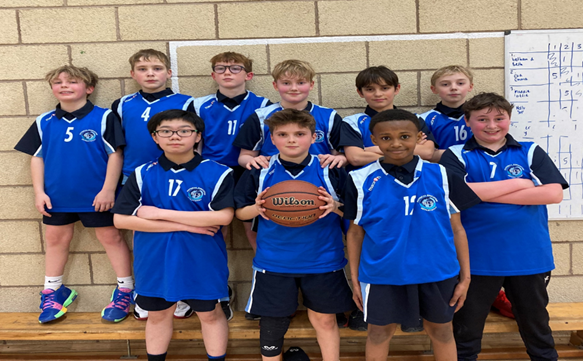
Year 9
The Year 9 Basketball team successfully qualified from the group stage of the National Schools Basketball competition, starting the knock-out stage against Thomas Telford School, a flagship Sporting school. But NLS proved far too strong and put in an amazing 104 – 26 win. They then made the two-hour journey to face White Cross School, the Hereford County Champions. Despite the long Journey, NLS again proved too strong for the opposition and ran out convincing 57 – 11 winners to progress to the to the last 16.
They then were drawn against South Bromsgrove School, the Worcester County Champions and continued their amazing progress in the competition by leaving with a 26 point win and a place in the last 8 of the National competition. The draw again, meant the team were away, this time it meant a three and half hour journey to the south coast to face off against Bohunt School from Worthing. Unfortunately, that was where their fantastic journey ended, as home court advantage proved the slight advantage that Bohunt needed, and they edged a close contest by just 7 points.
Despite the disappointment and the frustration that their fantastic journey was over. Mr Brannan is incredibly proud of the skill, commitment and passion that the boys have shown in getting to the last 8 of a national competition in their first year of trying and only their second year of playing together as a team. An amazing achievement. They have also won the District competition for the second year.

Year 10 Basketball District Champions
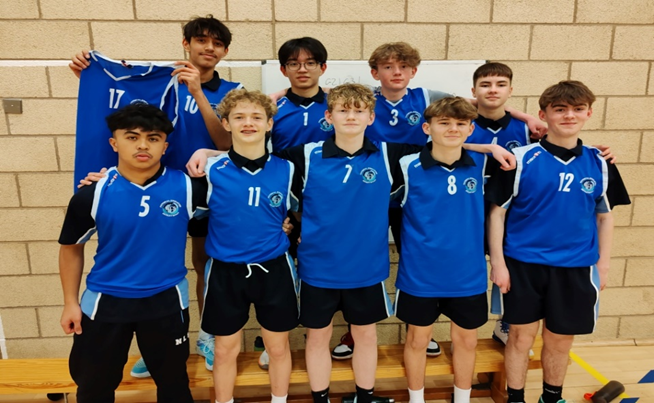
Football
Three North Leamington Football teams have progressed to the District Cup finals – which is fantastic.
The Year 7 team progressed to the final after a 3-0 win against Kineton in the semi final.
Year 7 District Cup Final
The District Cup final took place on Wednesday 9 April and the team hoped to follow the success of last year's Year 7 team and bring home a trophy in their first season. They faced Stratford School at Central Ajax Park in Warwick in the final; when NLS met Stratford School in their first ever game it was 6-5 to Stratford and NLS were determined to show their improvement and development.
NLS started the final strongly and dominated possession from the first whistle, creating some excellent scoring opportunities and playing some wonderful football. By the end of the first half they had scored three goals, 2 for Dan B and 1 for Max W to cement their dominance and reward their excellent play. In the second half, Stratford threw everything against NLS and made them fight with their backs against the wall to maintain their 3-goal lead, but in the end they kept their clean sheet and come out with a 3 -0 victory in the final!
Congratulations to all the boys that played in the final and the previous rounds on route to their Cup win.
Year 9 District Cup Final
The Year 9 team progressed to the District Cup final after beating Kineton 4 -0 in the semi-final the previous week. They went into the final hoping to repeat the success of our teams winning for the previous three years and win the cup again for NLS. Facing Stratford who, like the Year 7s, had beaten NLS in their first game of the season, NLS have been unbeaten since and started well, taking the lead through Danel Z, before Stratford levelled before half-time in a evenly matched first half. The second half remained very even, with NLS struggling to play the free flowing football they are capable of and finished at 1 – 1, which meant a nerve-wracking penalty shoot-out.
Reuben C who came in to play in goal at the semi-final stage, started extremely well, making an early save to put NLS in the driving seat and the chance to win with the first five penalties, but unfortunately, they couldn’t capitalise and so the penalty shoot-out went to sudden death. Amazingly, it went on until the 11th penalty for each team, but sadly it was Stratford who finally proved victorious and prevent NLS winning the trophy for the third time in a row.
A huge well done to all the boys who played in the final and had the courage and bravery to take a penalty in such a pressure situation.
And well done to all the boys who have represented the school teams at Football this season.
Indoor Athletics
The Year 7 and 8 boys and girls Indoor Athletics teams travelled to Myton to take part in the District Indoor Athletics competition, competing against Myton, Kenilworth, Campion, Southam, Kings High and Arnold Lodge.
In a highly competitive competition, NLS put on a great showing with the Year 7 boys, Year 8 Boys and the Year 8 Girls all finishing as runner-up in their perspective competitions.
A huge congratulations to all those that represented NLS with distinction.
Squash Success
Leamington Lawn tennis and Squash Club recently held the Leamington Junior Club Championships and it was great to see that both the boys and girls finals was made up exclusively by North Leamington School pupils.
Well done to Heidi C in Yr 9, and Jacob E in reaching the final and congratulations to Sam C in Yr 11 and Charlotte P in Year 12 on winning the titles.
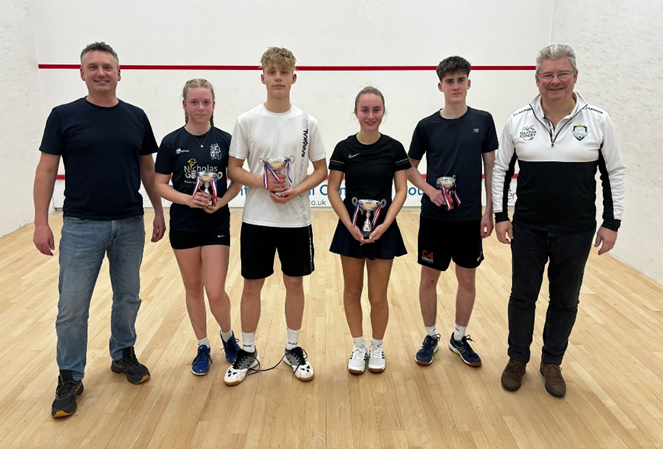
Netball
NLS took three teams to King's High to play in the District Cup and Plate finals on Wednesday 2 April.
Year 10 District Plate Final v Aylesford PLATE WINNERS
Our Year 10 started strongly in the District Plate Final with our defence putting pressure on the Aylesford shooters, making interceptions to keep the score down in the first quarter to two goals with NLS leading with four. The team continued to pull ahead with brilliant shooting to a 14-3 lead. The girls worked the ball through the court making many interceptions to prevent Aylesford gaining possession in their attacking end, midcourt worked tirelessly to feed the ball from defence to attack who continued to turnover the ball when it got to the opposition's end and kept defence tight.
Congratulations girls - plate winners!
Player of the match: Eva
Year 8 District Cup final v Kenilworth CUP WINNERS
Year 8 went into the District Cup final knowing it would be a tough game against Kenilworth and we are delighted that the girls won.
The first quarter went goal to goal ending in 5-5. The second quarter ended 8-9 and NLS did well adjusting to the windy conditions. Quarter three saw NLS really began to find their best netball. With defence marking out players and making some brilliant interceptions, our shooters found their stride and NLS pulled ahead to 15-10. The team held their lead in the final quarter with mid court working the ball well down the court and sending fantastic feeds into the shooters. The final score 21 - 14 to NLS!
Congratulations girls. You have been unbeaten all year – a fantastic Cup Final win!
Player of the match: Lauren
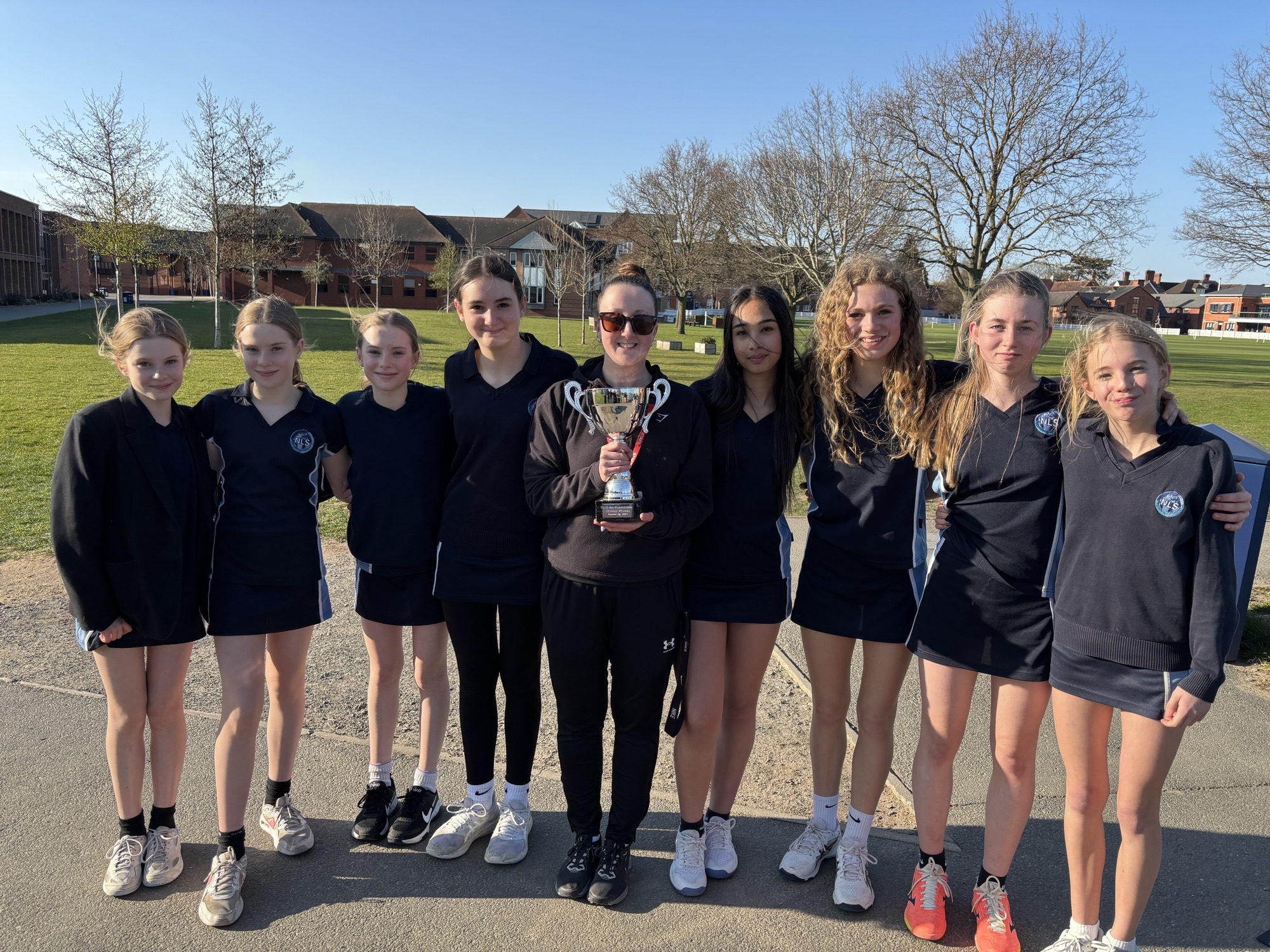
Year 7 District Cup final v King’s High
Our Year 7 team also reached the final of the District Cup and in a hard-fought final, NLS delivered a spirited performance against a strong King’s High side, ultimately falling 10-5 in a match that was far closer than the scoreline suggests.
The girls showed immense determination, with the defensive units on both sides making it difficult to score. NLS started well, moving the ball smoothly through the court, but the opposition’s defence proved tough to break down. NLS remained composed, made crucial interceptions and displayed some excellent shooting to keep us in the game. In the third quarter, our defence stepped up even further, some brilliant blocks and rebounds made and mid-court players worked tirelessly to transition the ball forward.
All girls showed incredible teamwork and determination and although the result didn’t go our way, this was a performance full of heart, skill, and resilience. Every player gave their all, and reaching the cup final itself is a huge achievement. A massive thank you to our supporters for cheering us on—this team will come back even stronger next season!
Player of the Match: Evie for her outstanding overall performance
Dance Recital
Well done to all of our talented dancers at our annual dance recital on March 26. You were all amazing and showcased your wonderful talent and passion for dance.
We had nearly 70 students, from Year 7 to Year 13, involved with the performance including student photographers and student backstage crew who were brilliant in technical rehearsals and for the performance on the night. You should all be so proud of yourselves. We had an audience of over 200 people so thank you for everyone’s continued support with Dance at NLS.
There were a range of styles in the show including Contemporary, Tap, Jazz, Ballet and Commercial with a range of pieces from BTEC assessment work to extracurricular clubs and students own choreographies.
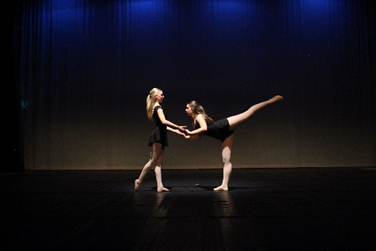 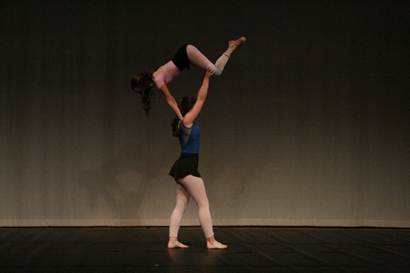
Also thank you to all the staff involved behind the scenes - without you there wouldn’t be a show! Well done to KS3 dance club on their performance together, you were so professional and enthusiastic during the show and I hope you have many more performances to come at NLS. See you again next year! Miss Davis

BTEC Dance Y10 & Y11 Assessments
Year 10 & Year 11 have had a busy Spring term in their BTEC Dance assessments with Year 10 completing their Component 2 ‘All that Jazz’ repertoire assessment and Year 11 completing their final Component 3 choreography exams. They have all worked so hard to achieve the best they possibly can, and I hope they are pleased with their results in the summer.
 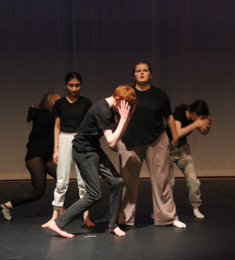
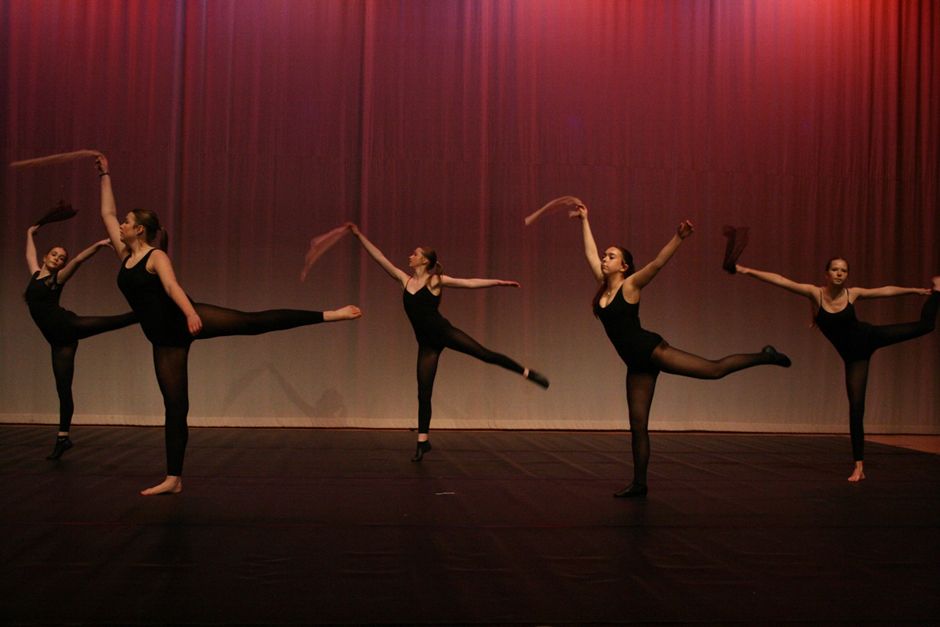
I look forward to seeing Year 10 grow and develop as they continue on the course, and I would like to wish Year 11 good luck with their summer exams and hope they continue to dance as they move onto their next chapters.
|
|
|
Year 7
As part of the healthy lifestyles unit, Year 7 have examined the importance of making healthy choices including prioritising sleep and avoiding energy drinks. Students have also looked at some of the physical and emotional changes that happen during puberty and the importance of good personal hygiene as we get older.
Year 8
Year 8 have been exploring factors that can impact on mental health such as body image and bereavement. These topics can be very challenging for students and we have been so impressed by the way they have contributed to discussions and the empathy they have shown to their peers.
Year 9
Year 9 have been looking at signs and symptoms of stress and anxiety. They have been working together to come with strategies to support young people who might be affected by this. Students have responded to sensitive issues raised here with a great deal of maturity.
Year 10
Students have been examining substance misuse and addiction and the short and long term impact this can have on all area of a person’s life.
Year 11
Students have been looking at how to keep themselves and other safe in new and potentially risky situations. It has been lovely to see them working collaboratively when examining case studies and offering sensible advice and strategies for staying safe..
Year 12
As part of the relationships unit students have been examining the importance of looking after their sexual health. We have also looked at the potential risks associated with body alterations. Students have been extremely engaged and have made some insightful contributions to class discussions.
Year 13 have been looking at the signs of coercive and abusive relationships and have been discussing strategies for exiting relationships respectfully and safely. Students have shown a great deal of maturity and empathy throughout.
|
|
|
This term, Year 13 students have been studying one of the more ‘classic’ aspects of psychological study, Cognition and Development which attempts to tackle and study how children develop over time. Students have been introduced to some famous names including Piaget, who investigated how children learn the ability to put themselves in other peoples shoes ,and Vygotsky who studied the importance of language and other people in how children learn both knowledge and socialisation abilities.
Year 12 concluded their studies of Attachment’ and ‘Approaches and began the next stage of the numeracy aspects of Research Methods, and Clinical Psychology. Below is our recommended reading, listening and watching list for the next half term.
Reading list:
- The Happiness Hypothesis by Jonathan Haidt
- Reaching Down the Rabbit Hole by Dr Allan Ropper
- The Man Who Mistook His Wife for a Hat by Oliver Sacks
- The Happiness Hypothesis by Jonathan
- The Psychopath Test by John Ronson
Podcasts:
- The Happiness Lab (Lecturer from Yale University discussing how to be happy based on research!) (Spotify/Apple music)
Documentaries/films:
- A Beautiful Mind
- Shutter Island
- Black Swan
This half term has been an exciting one for Psychology students, with the launch of our brand new weekly email newsletter, CogniNews! This initiative has provided students with access to up-to-date research to support their wider reading, alongside key information on weekly revision and intervention sessions. Each edition also features recommended films, career spotlights, and interactive opportunities to enhance their learning experience.
A particular highlight of CogniNews has been the introduction of an interactive statistics test, designed to support Year 13 students with their work on inferential statistics. This term, they have been getting their 'maths caps' on, focusing on when to use different statistical tests and how to determine significance using critical values tables. So far, 35 students have completed the first interactive test, with a special shout-out to Naomi, who was the first to take on the challenge! Students are encouraged to keep an eye out for these weekly quizzes, with R2 rewards available for participation.
Recommended revision guide/textbooks for all topics in Year 13:
- AQA Psychology for A Level Year 2 & A2: 2nd Edition by Cara Flannigan (TEXTBOOK)
- AQA Psychology for A Level Year 2 & A2 Revision Guide: 2nd Edition by Cara Flannigan (REVISION GUIDE)
We also recommend www.physicsandmathstutor.com as they have detailed notes on all topics, past papers, and have past paper questions organised by topic. This is completely free!
Finally, a huge congratulations to our February and March ‘Psychologists of the Month’: Martyna (year 12) and Holly (year 13). Both students awards were due to their hard work and dedication during the mock seasons.
|
|
|
Year 13:
We have now finished the course content with Year 13 RE and will be focusing on revision after Easter. Please remind students that once exam leave starts, we will be available to support during their timetabled lessons right up until the final Ethics paper. We will also continue to offer after-school sessions for students every Tuesday in H118 from 3.20-4.30. Please encourage your children to make contact with us if they need anything while revising at home.
Year 12:
Students are now almost halfway through the course content in Philosophy, Ethics and Christianity. It is really important that students are reviewing their notes outside of the lesson and are creating revision resources for each topic as this is the best way to secure knowledge and prepare for assessments and their progression exams in the summer term.
Year 10:
Year 10 have been working very hard this half term revising key topics for their final RE exams. Please remind your child to check Go4Schools regularly as exam questions are set weekly to encourage students to revise and apply their knowledge. Students have been given a Christianity past paper to complete over the Easter break. If they need any support with this, please let the RE team know. After school revision sessions will continue every week until the final exam. It would be great to see as many students attending as possible.
Year 9:
Year 9 students have been working on Paper 3 (Islam). They have been focusing on key beliefs and teachings and how they impact the lives of religious believers. We have been very impressed by the thoughtful discussions students have engaged in on the afterlife, freewill and predestination. Please encourage your children to complete the revision tasks set on Go4schools so that they are fully prepared for end of unit assessments.
Year 8:
Year 8 students have been studying Judaism this half term.
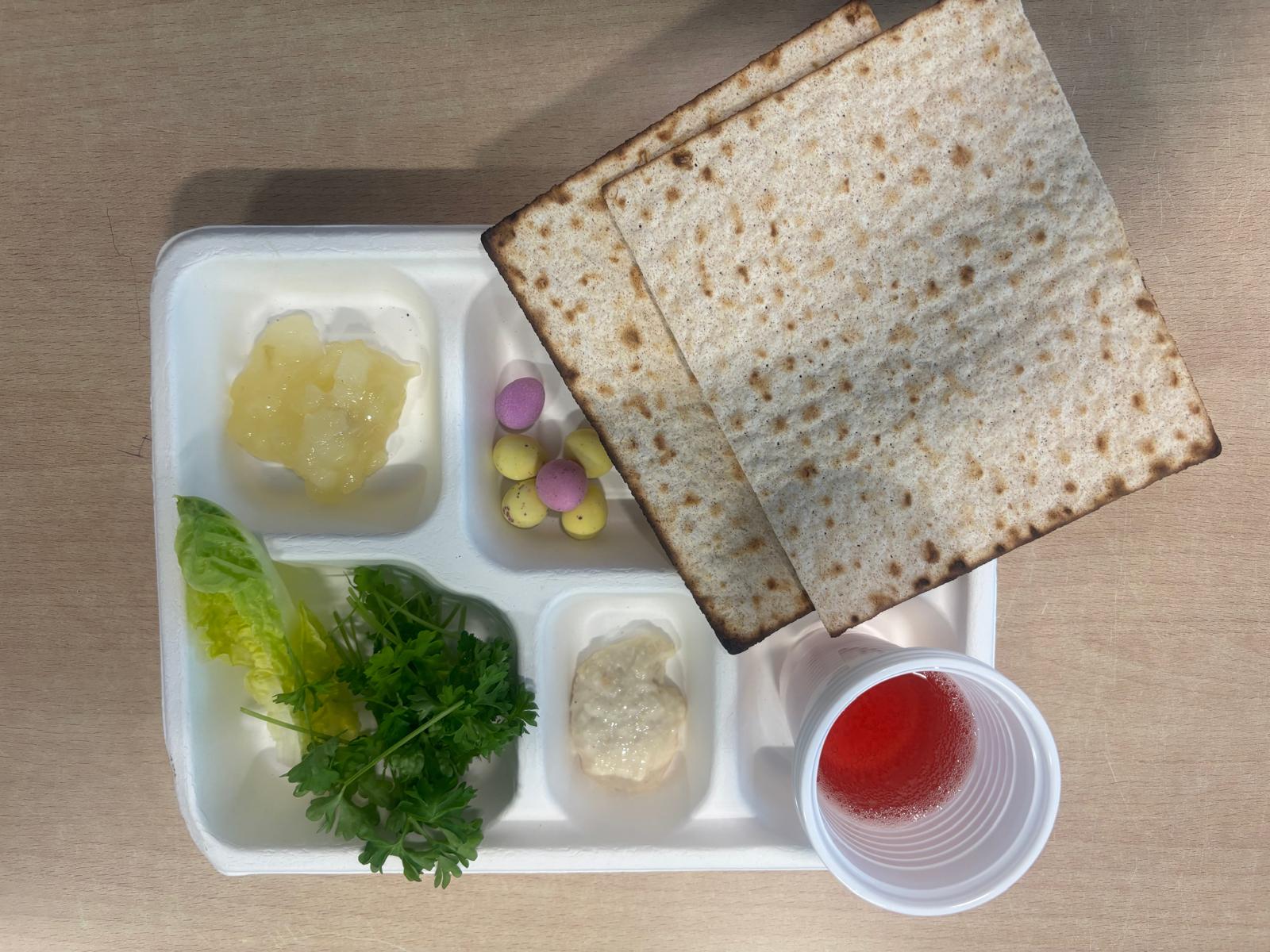
They have particularly enjoyed recreating the Passover meal in lessons through tasting the different elements and discussing the meaning behind this.
 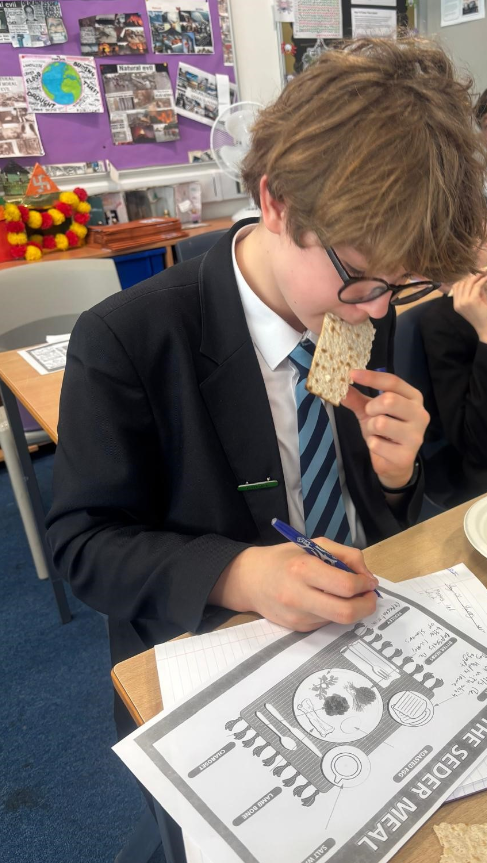
Year 7:
Year 7 students have been exploring the foundations of Christianity. We have had some very interesting discussions on miracles and it has been lovely hearing the students talk about their personal experiences of ‘miracles.’ As we begin to look at the impact of parables, we are looking forward to seeing our classes write and perform a modern day parable.
|
|
|
Year 7 Moss Safari
Students embarked on a Moss Safari, using microscopes, to explore the world of tiny creatures living within moss. Students learnt how to use a field guide to identify organisms, to better understand the diversity of life in their local environment. They also practised scientific skills such as calculating magnification and creating detailed scientific drawings to record their findings. This activity encouraged curiosity, attention to detail, and an appreciation for the intricate natural world, while developing their ability to use scientific tools and methods. Some Year 12 students in the science journal reading club have also joined the action and volunteered to do some research, finding out more about some of the organisms they observed.
Year 8 diving into the world of electricity
In Year 8, students have been diving into the world of electricity, gaining a deeper understanding of how this essential force shapes our daily lives. The topic has introduced them to key concepts such as electrical circuits, conductors and insulators, voltage, current, and resistance. Through hands-on experiments, students have learned how to build simple circuits and measure voltage and current, fostering both practical skills and critical thinking.
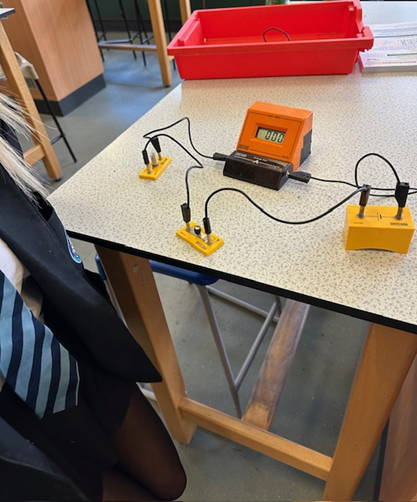 A major focus has been on understanding how electricity flows through circuits and the components that make up a complete electrical system, such as batteries, bulbs, and switches. A major focus has been on understanding how electricity flows through circuits and the components that make up a complete electrical system, such as batteries, bulbs, and switches.
Students also explored the differences between series and parallel circuits and the real-world applications of each. The topic provides a solid foundation for future learning in science, including energy transformation and sustainability.
In addition to the theoretical concepts, students have been encouraged to think about the safe use of electricity at home and school. They are developing a keen awareness of the importance of electrical safety, including how to handle electrical devices safely and understand the risks involved.
This topic has not only equipped Year 8 students with a deeper scientific understanding but also sparked curiosity about how electricity powers the world around us.
Year 9 investigating the composition of food – food tests
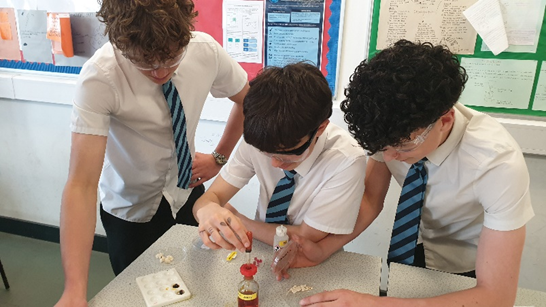 Year 9 students have begun to learn about the composition of nutrients in food through practical work. They have tested different food samples to identify the presence of certain nutrients, such as sugars, starch, proteins, and lipids. Year 9 students have begun to learn about the composition of nutrients in food through practical work. They have tested different food samples to identify the presence of certain nutrients, such as sugars, starch, proteins, and lipids.
 Key observations made by students during such reactions include the appearance of colour changes such as observed when testing for starch in which iodine solution turns blue/black which can then be recorded as a positive result. Key observations made by students during such reactions include the appearance of colour changes such as observed when testing for starch in which iodine solution turns blue/black which can then be recorded as a positive result.
These experiments help students understand the composition of food and how to test for specific nutrients, appreciate the importance of identifying nutrients in different foods and to help them inform decisions when it comes to a balanced diet. Additionally key skills are further developed such as making observations during a chemical change, applying knowledge in order to make predictions and then analysing their findings in order to make a conclusion.
Year 9 STEM Day: Designing the Mars Lander of the Future
On a thrilling STEM Day, Year 9 students embarked on an out-of-this-world challenge: designing and building their very own Mars lander. This hands-on activity combined creativity, teamwork, and problem-solving as students worked to tackle three critical engineering features—cushioning, stability, and drag—all crucial elements in ensuring the safe landing of a spacecraft on the Martian surface.
Choosing the Perfect Landing Site
The adventure began with a mission of vital importance: selecting the ideal landing site on Mars. Students researched and assessed various locations based on the availability of essential resources such as fuel and sunlight. They explored diverse terrains, from rocky landscapes to flatter plains, each offering its own set of challenges and benefits for sustaining a Mars base. The ability to choose wisely laid the groundwork for the rest of the project, as the success of the lander would depend heavily on the environment it would operate in.
Designing the Lander
Once the perfect landing site was chosen, the real work began. Students formed groups and focused on three essential design features of their Mars lander: cushioning, stability, and drag. To get a better understanding of these challenges, each group first built three smaller prototype landers that focused on one design feature at a time.
For cushioning, students experimented with materials that would best absorb impact, mimicking the forces a spacecraft would face when landing on Mars. Stability tests focused on ensuring that the lander would stay upright upon landing, even on uneven terrain. Finally, the drag was tested by exploring different shapes and materials to minimise any forces acting on the lander as it approached the Martian surface.
Final Design and Presentation
After several rounds of testing and adjustments, students were ready to integrate the best features from their prototypes into their final design. They combined their learnings, resulting in a lander equipped to tackle all three challenges. The culmination of their hard work was a group presentation, where each team had to pitch their final design to an audience of 60 students. Presentations included explanations of their chosen landing site, their design decisions for cushioning, stability and drag, and how these features would help their lander succeed on Mars.
The excitement in the room was palpable as each group unveiled their designs and presented their thought processes. It was clear that every student had poured time and effort into this project, and their enthusiasm was infectious.
A Job Well Done
The day was a huge success, with students showing exceptional teamwork, creativity, and dedication to solving real-world engineering challenges. Their engagement and enthusiasm throughout the process were a credit to the school, and we are incredibly proud of their achievements. It was a day full of learning, exploration, and fun—one that truly brought STEM subjects to life in an exciting and tangible way. Well done to all involved! Your ingenuity and problem-solving skills have made you pioneers of the future.
Year 10 Titration
As part of the Chemistry GCSE curriculum, our Year 10 students carried out a titration practical. This essential experiment helps students develop key scientific skills while investigating how to determine the concentration of an unknown solution.
Titration is a precise laboratory technique used to find the concentration of an acid or alkali by reacting it with a solution of known concentration. Students use burettes, pipettes, and indicators to identify the exact point of neutralisation.
Key Learning Objectives:
✔ Develop practical skills in accurate measurement and observation.
✔ Understand how to calculate concentrations using mole equations.
✔ Apply knowledge of acids, alkalis, and chemical reactions.
How You Can Support:
- Ask your child to explain the method and safety precautions involved.
- Encourage them to practise titration calculations using their class notes

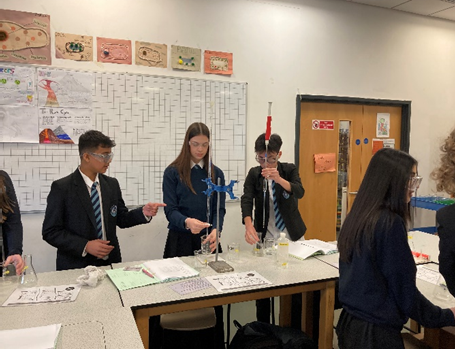
Year 10 Triple students have been working incredibly hard, creatively engaging in their Biology revision and successfully mastering key topics such as cells, respiration, photosynthesis, DNA, and enzymes! Their enthusiasm and dedication have been truly inspiring as they’ve explored these essential concepts in innovative and exciting ways.
To prepare effectively for their exams, students have been practising a range of key revision techniques, including active recall, past paper questions, mind mapping, flashcards, online revision platforms such as Cognito and Seneca, as well as exam-style timed practice. These strategies have helped them to consolidate their knowledge, improve retention, and develop confidence in answering exam questions with precision.
It’s fantastic to see their hard work paying off as they refine their understanding and sharpen their exam skills. Keep up the amazing effort, Year 10
Year 11 Biology Triple Scientists: Exam Preparation
As we approach the final stages of Year 11, my Biology Triple Science students are working incredibly hard to ensure they are fully prepared for their upcoming GCSE exams next term. This high-achieving group is focused, dedicated, and continually striving to exceed their target grades. Their consistent commitment to their studies is truly commendable, and I am incredibly proud of the effort they put into every lesson and revision sessions.
In the lead up to the exams, it’s essential that students not only revise the content thoroughly but also perfect their exam technique. Some effective strategies they are focusing on include practising past papers under timed conditions, which helps them become familiar with the format of the questions and the time constraints. Active recall and spaced repetition are also key methods in reinforcing their knowledge, while working through mark schemes allows them to understand exactly what examiners are looking for in their answers.
My amazing students have been encouraged to work on their exam technique by reading questions carefully, identifying command words such as "explain," "describe," or "evaluate," and structuring their answers accordingly. The ability to focus on precision and clarity is something they are refining in every revision session.
I am particularly pleased to hear that at least 50% of this exceptional group are keen to pursue Alevel Biology at NLS next year. Their passion and drive to continue their studies in the subject is a testament to their hard work and enthusiasm for this subject.
I have no doubt that they will continue to impress in the lead up to the exams and beyond, and I wish them all the best in their preparations. Keep up the outstanding work
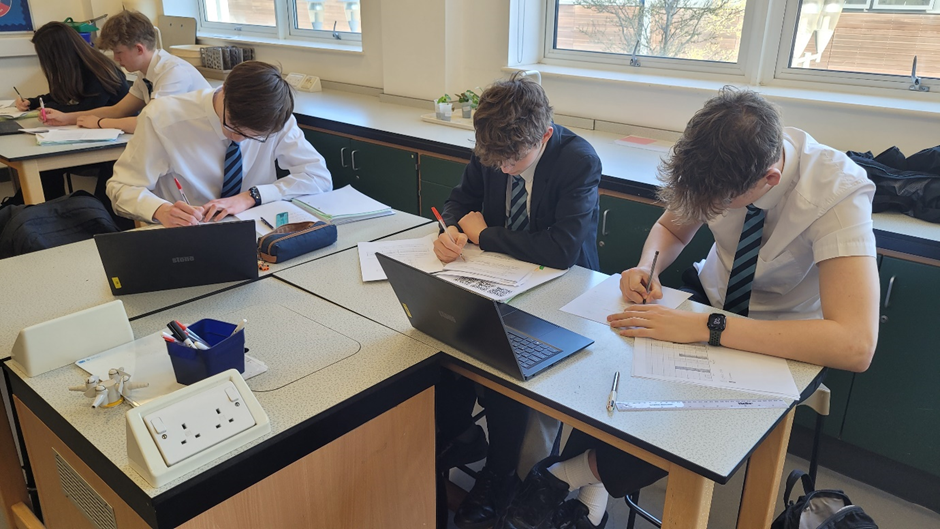 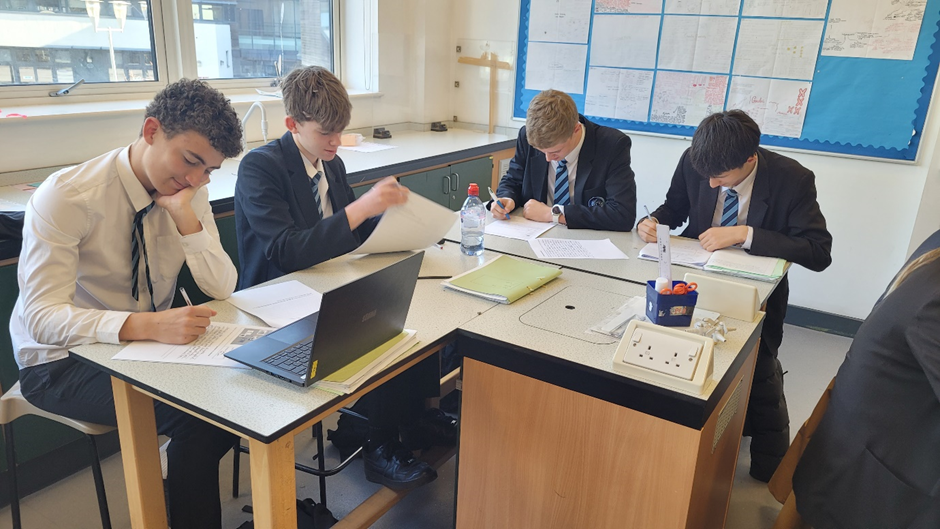
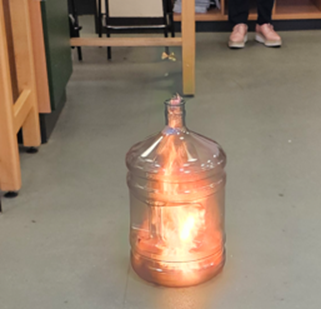 Year 11 Energetics Year 11 Energetics
Year 11 have been revising key areas of the chemistry syllabus.
Students looked at how temperature is linked to energy transfers for exothermic and endothermic reactions.
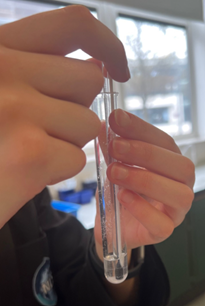
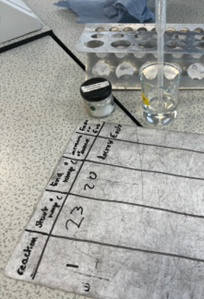
They carried out a series of experiments finding the initial and final temperatures before and after each reaction. They also revisited how to draw and label energy profile diagrams, as well as how energy is linked to the breaking and making of bonds.
Year 11 - Revisiting static electricity and circuits
Year 11 have been busy preparing for their final exams and have revisited static electricity and circuits.
 The Van de Graaff generator provides an excellent opportunity for students to experience static electricity, with students observing demonstrations of lighting fluorescent tubes, making pie tins repel from each other, and charging up bodies, including their own! The Van de Graaff generator provides an excellent opportunity for students to experience static electricity, with students observing demonstrations of lighting fluorescent tubes, making pie tins repel from each other, and charging up bodies, including their own!
Using the Van de Graaff generator, seeing the effects on a student’s hair in a mirror, and experiencing a controlled shock with a grounded class mate, is such a memorable experience and is one of the Science department’s favourite lessons.
Year 12 Success in Senior Physics Olympiad
We are incredibly proud of our Year 12 Physics students for their outstanding achievement in the Senior Physics Olympiad, which took place in March. This prestigious and highly challenging competition pushes students to think outside the box, applying their knowledge to complex problems that go beyond the standard curriculum.
Our students demonstrated remarkable resilience, dedication, and problem-solving skills throughout the competition. Their hard work paid off with one student, achieving a Gold award, two earning Silver, eight receiving Bronze, and the remaining students awarded Commendation certificates.
This is a fantastic accomplishment, and we congratulate all our students on their success. Their performance highlights the strength, the talent and commitment of our students. We hope to see even more participation and success from other year groups in the future! Well done, everyone!
Year 12 Biology
Our Year 12 students have been immersed in a comprehensive unit on mass transport, which covers the heart, blood vessels and blood. This module provides an in-depth understanding of the circulatory system, including the anatomy and physiology of the heart, the structure and function of blood vessels, and the composition and roles of blood. Through engaging activities and interactive discussions, students developed a thorough appreciation for how these components work together to sustain life. I would encourage parents to discuss these topics with their children and support them in their learning journey.
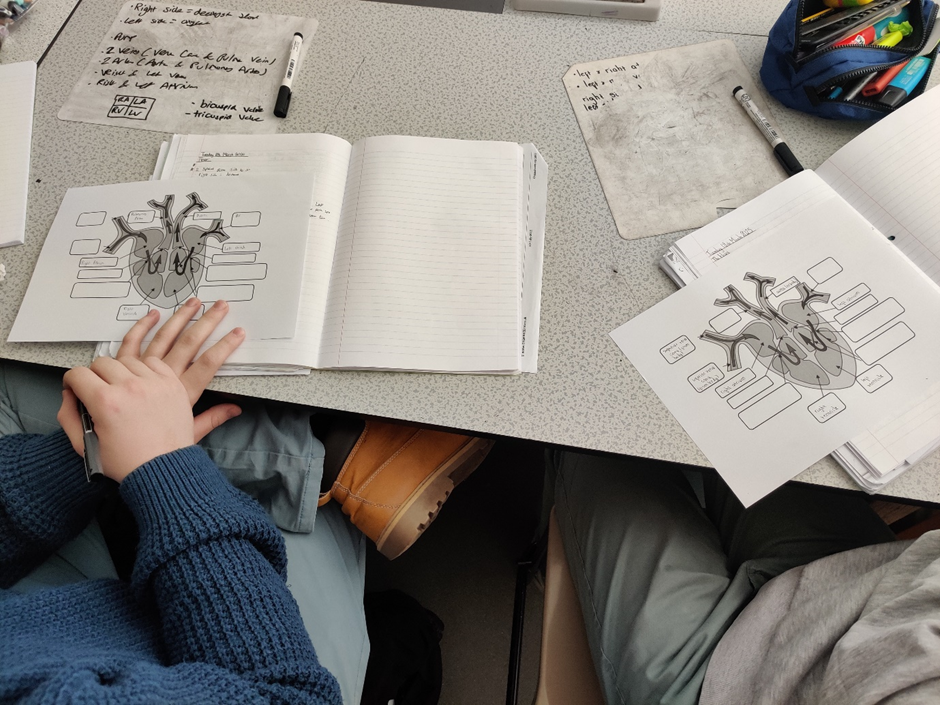
Year 13 Investigate what actually is in the drugs that we take!
Year 13 Chemistry students have successfully completed their final required practical in organic chemistry, focusing on Thin Layer Chromatography (TLC).
Students worked with an Anadin Extra tablet alongside pure samples of paracetamol, ibuprofen, aspirin, and caffeine. Their objective was to analyse and determine which of these active ingredients were present in the mixture. Using TLC, they carefully prepared and developed chromatograms, then compared the retention factors (Rf values) of the known compounds with those found in Anadin Extra.
Students demonstrated their practical skills, analytical thinking and understanding of separation techniques, all essential for their A-level studies and future scientific endeavours. Their ability to interpret chromatographic data and draw accurate conclusions reflected their dedication and hard work throughout the course.
 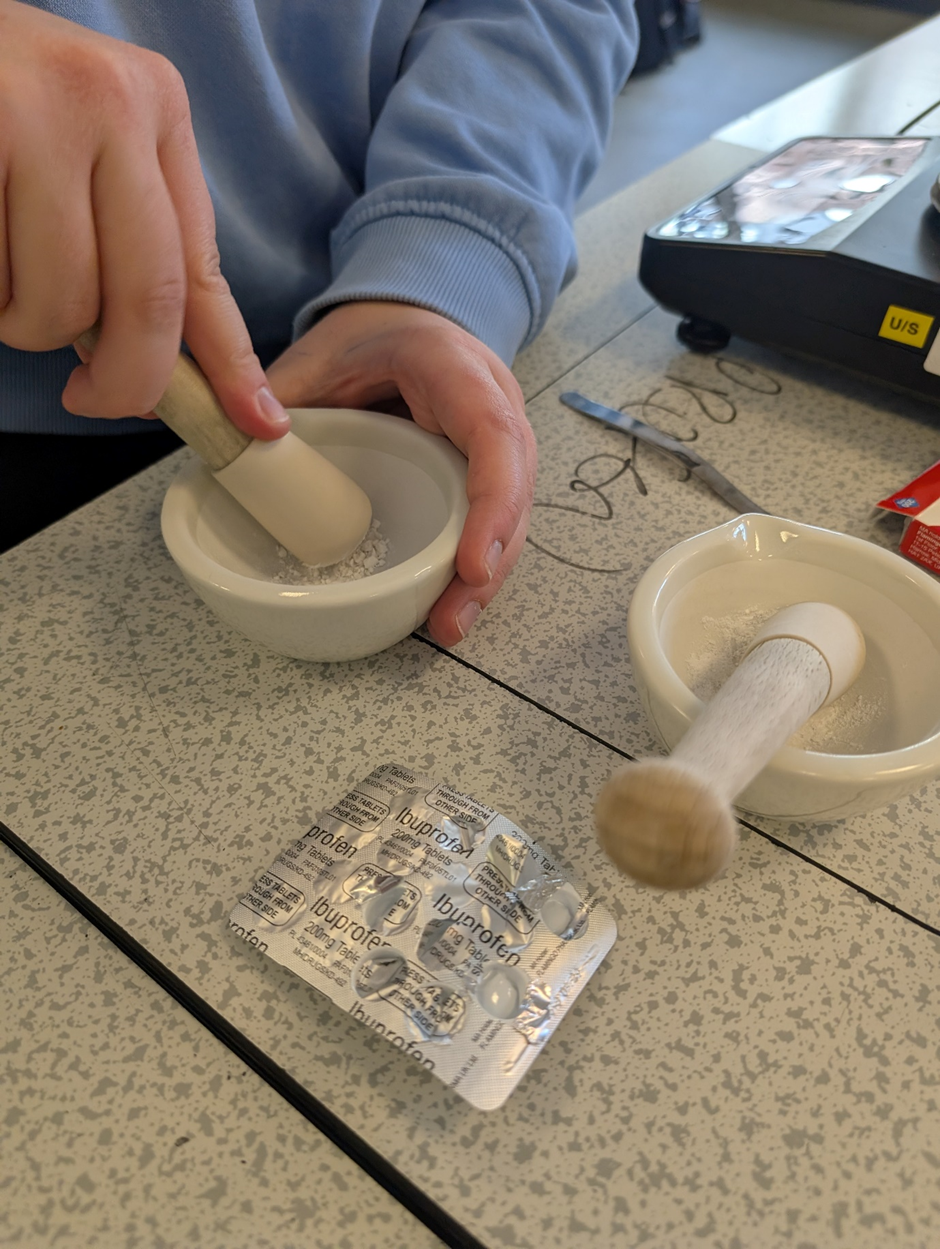
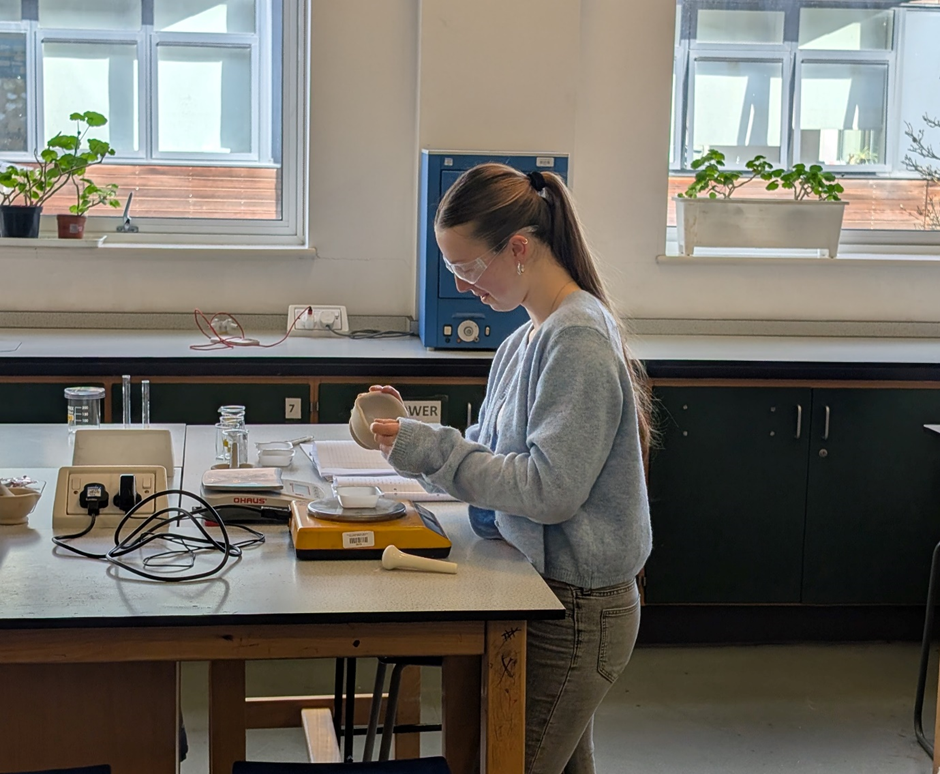
|
|
|
Yesterday, (April10) Year 13 Sociology students enjoyed an online seminar from Keith Trobe who has been a senior examiner for the exam board for the past 35 years and principal examiner for many of those. He is also a contributing author to the students A Level textbook in Sociology (and a really great guy)! The students had the great experience of listening to Keith discuss the top tips to approaching questions, many of which have been applied to the students lessons. He also shared some great knowledge on the questions that have historically scored the lowest and some knowledge of the skills that need to be applied to these questions to secure the top mark band. We had another great year of experiencing the ‘insider knowledge’ from Keith and have no doubt in the final few weeks this will support our students in making the difference.
Sprint finish will be shared with students after Easter. We have these sessions for the last 10 years prior to the final exams and have proven to be a great opportunity for students to re-visit all knowledge and skills requirements for each of the papers in one sitting. Knowledge will be re-visited in context of the questions that could be asked for each topic. We look at the hot contenders for questions in the 2025 exam papers and the days acts a good refresher for each paper. Please encourage the students to attend on these days.
Year 12 have now completed the Families and Households topics and have finished the fourth topic of their ‘Research Methods’ element of the course. We have explored the practical and ethical strengths of a range of research methods that Sociologists use in their research, to uncover the patterns and trends in society; quantitative methods such as experiments and questionnaires, and qualitative methods including unstructured interviews.
Students have also completed some consolidation lessons to prepare for an interleaving assessment after the Easter holidays. This will provide good practise ahead of the progression exams in June. The interleaving assessment will include one 10-mark question and one 30-mark question and will cover the education topics we have completed. Focusing on this will enable the students to review their learning and make vital adjustments in this final term if needed. Past papers and revision questions and materials are available on the Digital Learning Hub.
This is also a good point to remind students to look at the recommended ‘reading and watching’ to enhance their learning and understanding of key topics. Recommendations are outlined on the curriculum overview section of the NLS website.

My current recommendation is ‘Gang Leader for a Day,’ a book which outlines Sudhir Venkatesh’s ethnographic study of the Black Kings Gang in Chicago, USA.
Much is in the press also relating to ‘toxic childhood’ and evidence of the impact of smartphones on experience of childhood.
Worth being aware of these topical links to enhance your understanding of these key concepts in wider society.
|
|
|
Year 11 Food Preparation and Nutrition Practical Assessment
Wow what a cook! Our Year 11s were truly amazing in the final cook of their NEA and I am so proud of the skill and commitment they all showed. Our second NEA has seen a large number of practical items being made to fulfil the tasks of ‘preparing school canteen food from around the world’ and ‘prepare a range of dishes for someone who is lactose intolerant’ Now that the NEA 2 is completed students should be turning their attention to revising for their upcoming written examination.
Students revision should focus around –
- Food Science
- Nutrition
- Food Provenance
- Food Safety and Hygiene

Here are some of the products made from the most recent assessment.
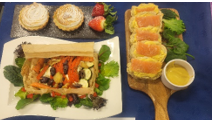 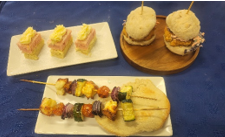
Year 7 and 8 and 9 DT classes
Classes have been working on a rotational system with Art Textiles, Food Preparation and Product Design with the last of these rotations taking place after Easter. Students will hopefully be able to show you some of the lovely items they have made in the workshop or in the food room. Thank you again to parents/ carers for supporting us by providing ingredients for the food lessons.
Some of the fabulous products KS3 have been making are shown below.
Students in Year 7 have been making marble cakes and spring rolls. They have focused on understanding some of the technical language that is used in our course such as dextrinisation and coagulation and this has been very much part of their learning through the practical tasks.
Year 9 students have also been making a complex range of dishes including jambalaya, stir fry and scones. We have focused on understanding nutrition, building upon those concrete skills such as vegetable preparation but also making lots of links to the world of work.
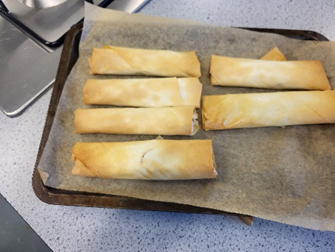 
 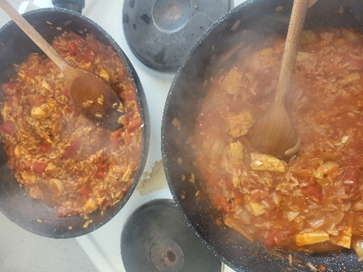
Year 10 Food
Students have completed new complex dishes over the past term, some of these have been themed towards the season or event that is approaching. Cooks that have occurred throughout the past few weeks include fishcakes, Battenberg, Sachertorte, and as we approach Easter students have had a little more freedom with themed cooks.
Next term students will be making a puff pastry and create a vanilla slice, learning about how we laminate the pastry. We also have homemade pasta and tortilla wraps coming up in the next term.
Alongside the practical elements students have also been concentrating on the theoretical aspect of the course by looking at sustainability, farming initiatives, and seasonality.
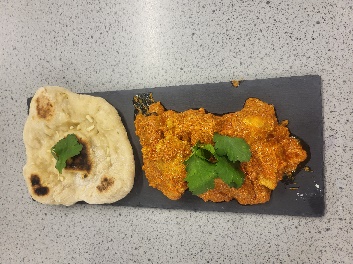 
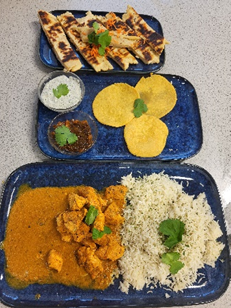 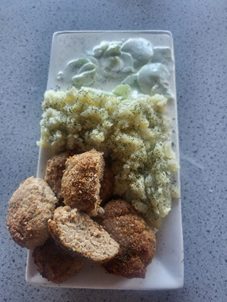
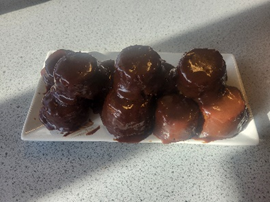 
Year 12/13 – Design Technology
Our A-level group have been working hard on a range of different design problems. They have all come up with their own design issues and have been looking to redesign and develop these ideas further. We have seen a wide range of different designs from a camera film scanner, a garage workstation and a dance travel storage. The students have master a range of skills using the 3D printer, Laser cuter and a MIG welder.

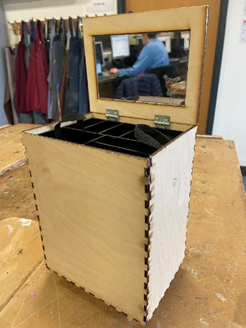 
 Year 11 – Design Technology Year 11 – Design Technology
Year 11 are finishing their GCSE practical work and have been working on a range of different ideas.
They have excelled in using CAD/CAM to create their designs and have used different design inspiration to apply a design movement.
We are really happy with the results and look forward to their final outcomes.
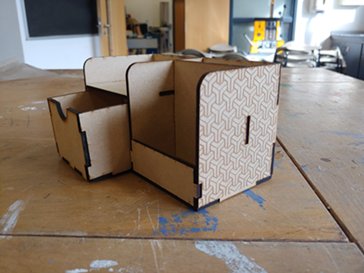 
Year 10 – Design Technology
The year 10 group have been busy creating their wooden finger jointed boxes by focusing on a comprehensive range of hand skills. The students have customised the boxes by adding latches and personal decoration using their CAD and CAM skills. This practical experience will be vital for when they start their coursework in the summer term.
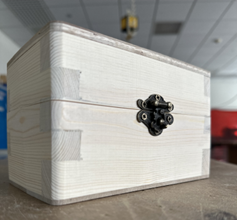 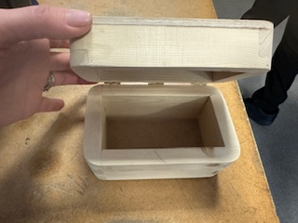
Year 9 – Design Technology
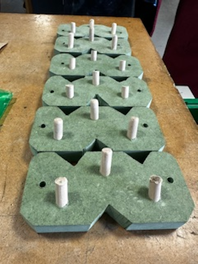 Year 9 groups have made a range of different projects this term and put to good use both their design and making skills to produce an electric toothbrush holder and a key rack. Year 9 groups have made a range of different projects this term and put to good use both their design and making skills to produce an electric toothbrush holder and a key rack.
Students have built upon their previous knowledge of joints which they learnt in year 8 to create a really sturdy and aesthetically pleasing project.
We are hoping that some of the students will chose Design & Technology for their GCSE next year and look forward to them coming up with new and improved products.
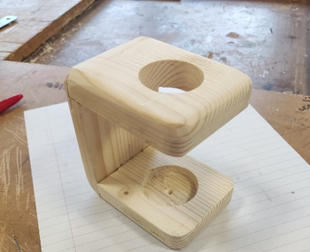 
Year 8 – Design Technology
Year 8 have been working on their storage boxes by advancing their skills in marking out and shaping. The students have also had a chance to personalise the storage boxes to their own needs from animal treat boxes to jewellery boxes. They have all worked really hard and myself and Mrs Long are really pleased with the end results.
 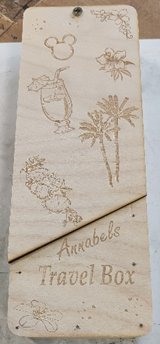
Year 7 – Design Technology
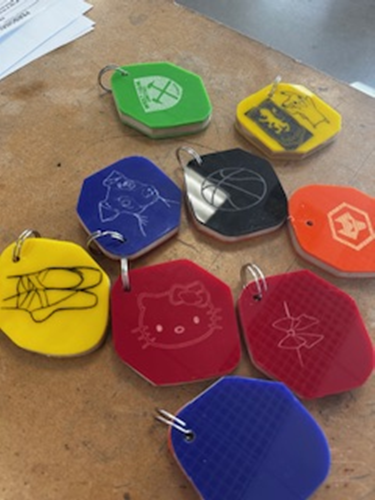
Year 7 have been designing and making ID luggage tags which they can attach to their school bags.
Students have really enjoyed getting stuck into the practical work and now have the confident to use a range of tools to mark out and shape their products.
They have also been introduced to CAD/CAM which has enabled them to personalise their product by adding pictures and letters to their work.
|
|
|
|
Year 11 and 13 have been completing their exam prep, with the GCSE exam having taken place on 8 and 9 April and the A level after the Easter break on 28, 29 and 30 April. We wish them all the best and the creation of a refined outcome.
Year 7 Character Art
After looking at the work of Mr Doodle and Yoshitomo Nara, students have demonstrated their knowledge of illustration techniques and character art,
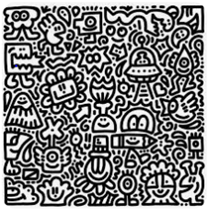 
Here are just a few pieces that show how students have utilised their learning to create interesting murals, and a protest piece. Sketchbooks have been used to document their ideas, as well has refined paintings and mixed media artwork.
Mr Doodle Art-colouring books have inspired students this term to create their own mural.
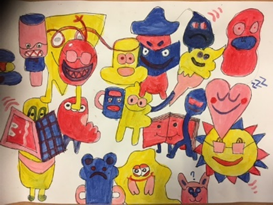 
 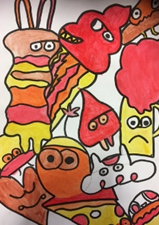 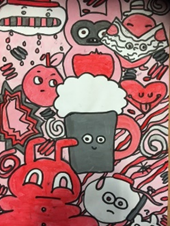
Nara Protest Posters.
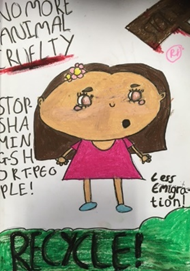 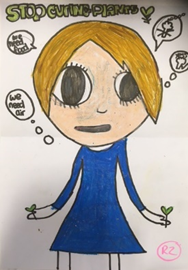 
 
Year 8 Clay masks inspired by the Artist Kimmy Cantrel.
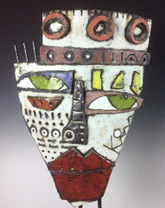 Students have been busy learning about the Ceramic Artist Kimmy Cantrel, creating designs and clay masks of their own. Students have been busy learning about the Ceramic Artist Kimmy Cantrel, creating designs and clay masks of their own.
They have enjoyed creating their masks and have learnt to layer clay and indent patterns with simple tools to create patterns.
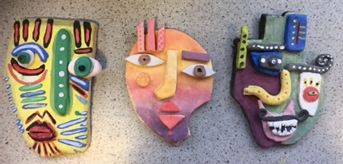 
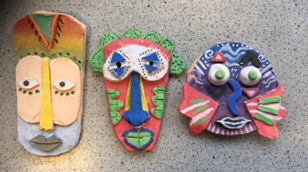 These skills will be further utilised in the under the sea project, where another clay outcome will be created. These skills will be further utilised in the under the sea project, where another clay outcome will be created.
Year 9 Loui Jover Artwork.

Students are further refining their Loui Jover responses ready for assessment. They have each created three artworks, focusing on the key features of the Artist. This is good preparation for any student wishing to take GCSE Fine Art, Textiles or Photography. By studying the key features of an Artist, they are creating a check list, which they then use to create their own artwork.
Below are some of their fantastic responses.
The focus has been on using celebrity icons and the use of geometric shape, line and colour.
 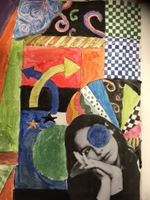 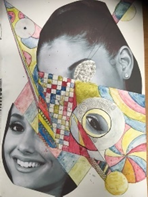
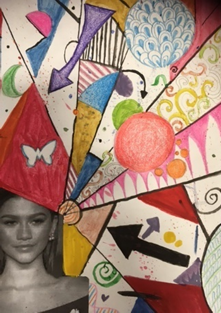 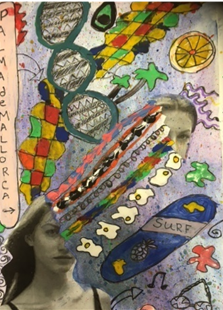 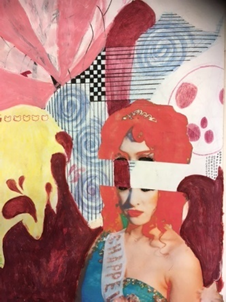

Analytical skills have been developed further this year, with students describing the original artwork by Loui Jover in detail, which has helped them understand how to effectively compose interesting and balanced artwork
Year 10 NEA Component 1 outcomes.
Students have been given the opportunity to test out a final piece and then create this in 10 hours of timed lessons. This helps students prepare for the NEA two controlled exam in April next academic year.
Below are some of the final outcomes created by our fabulous year 10 students. They have all performed well and it’s a pleasure to see creative and independent artworks, which have evolved from months of hard work in the students’ sketchbook. Each outcome is personal and unique to the student.
 
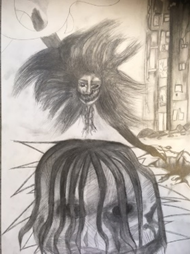  
 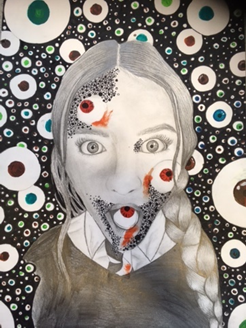 
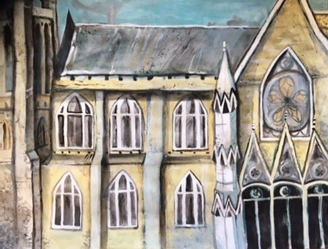 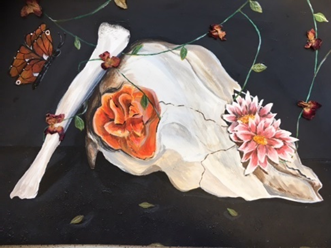 
Year 12 Sketchbook artwork
Our exceptional and creative students have now started their independent A level projects, each using research and their own photoshoots to generate responses. At this advanced level students are expected to describe artists work in depth and make effective use of materials, tools and techniques.
Below you will see a variety of pieces that capture the maturity and sophistication required to generate research, drawings and responses in their sketchbooks.
Students research examples
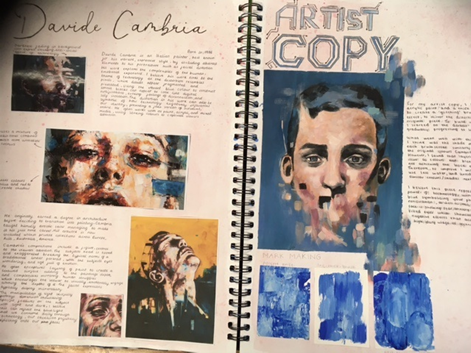 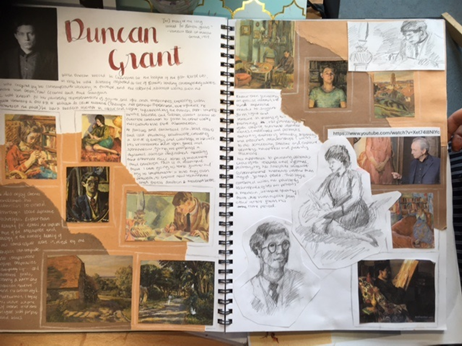
Students recordings examples
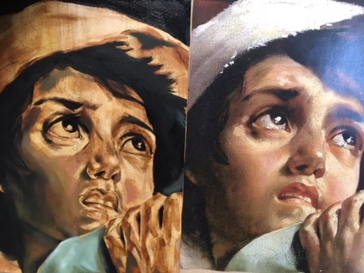
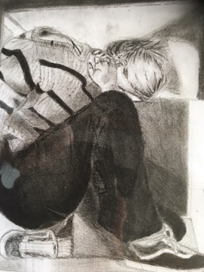 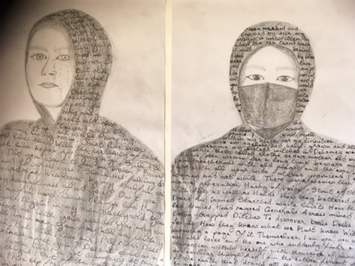
|
|
|
This is a very busy time of year in the Photography department as Y11 and Y13 students busily prepare for their terminal assessments. Both years are currently exploring and testing out different ideas for their final outcome pieces which they will then complete during their 10-hour exam. This takes place after the Easter break and we wish them all the best.
Year 9
This half term students have continued with their investigations into colour theory and light. They have been looking at how the use of colour filters can change and enhance their photographs. Using varied coloured cellophane, they have created their own versions of filters and then used these to create some interesting images both in school and for homework tasks.


Next term they will continue their investigations into light looking at shadows and silhouettes.
Year 10 are well into their Component 1 coursework project and have been investigating different manipulation techniques both by hand and in a digital format. This has created some interesting responses and development of their work and practices.

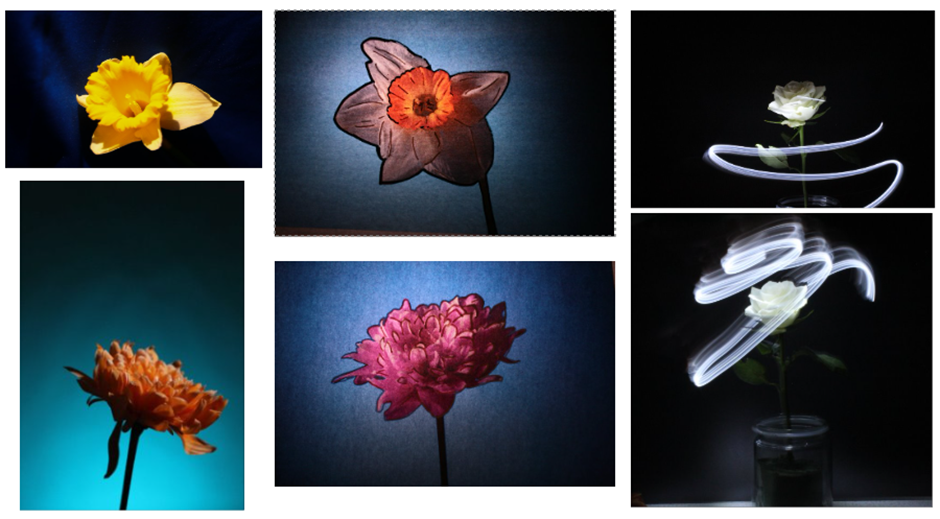

They will next move forward to explore varied ideas to develop into project outcomes.
Year 12
Students have now started their main Component 1 project and are currently completing their written research projects informed by in depth research and investigation into a topic of their choice. This is a great springboard and informs the practical part of their coursework. We have varied themes such as investigating the importance of image on the music industry, documenting the life of athletes, looking at the difference between the male and female gaze in fashion photography, the power and purpose of architecture and how this has been documented through photography and finally Surrealism in photography. We’re sure that these will make some exciting projects.
Below are some outcomes from their mini project which was completed at the start of the year.
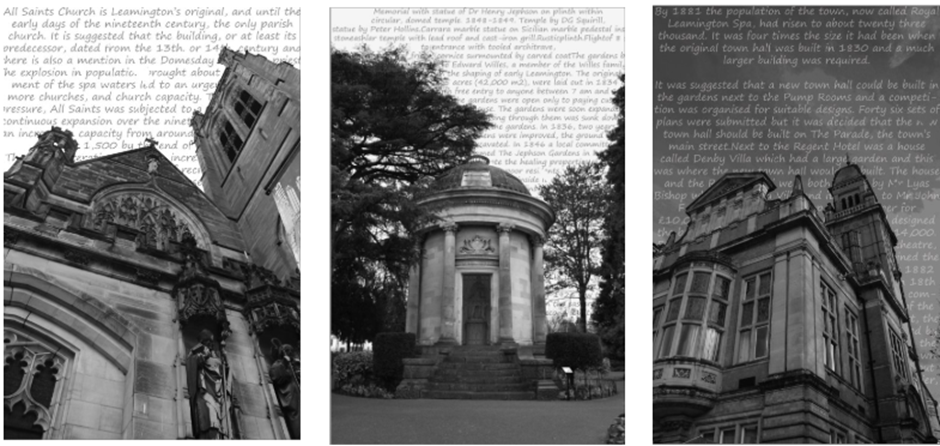
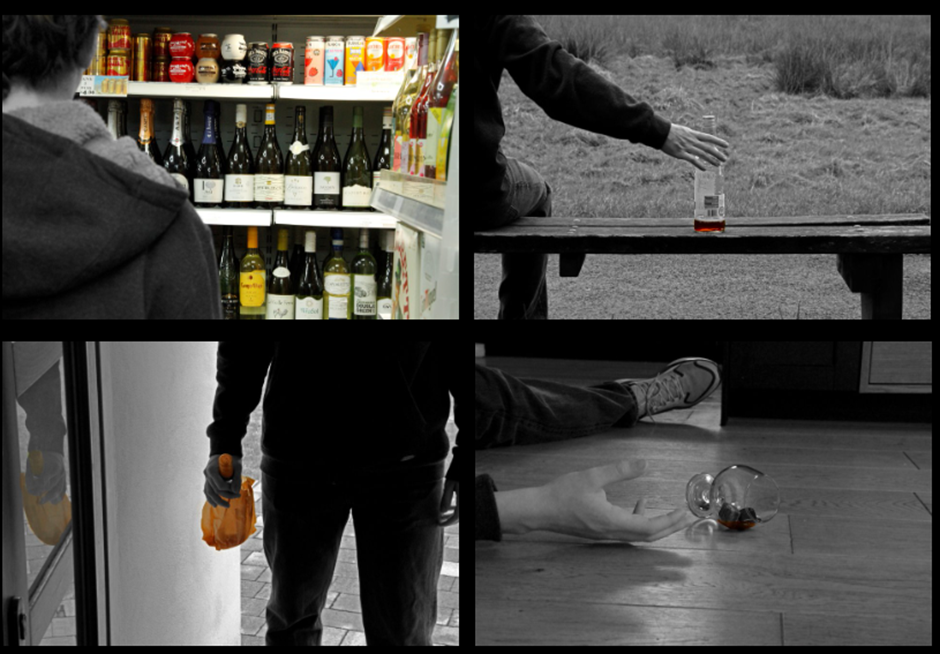

|
|
|
Year 11 and 13 have been working hard preparing for their exams with the Year 11s having completed their two-day GCSE exam on 10 & 11 April. The A level three-day exam takes place after the Easter break on 28, 29 and 30 April. Students have been experimenting with a whole range of techniques, such as print making, embroidery, dyeing and manipulating fabrics.
We can’t wait to see their final pieces!
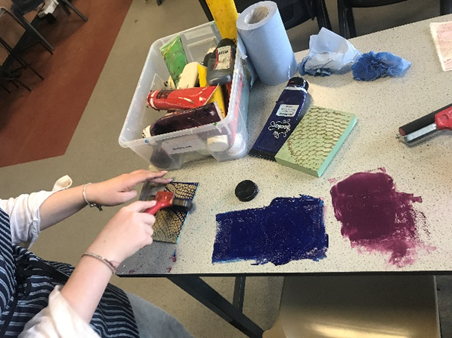
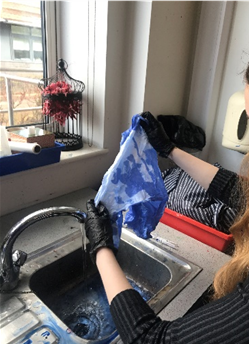 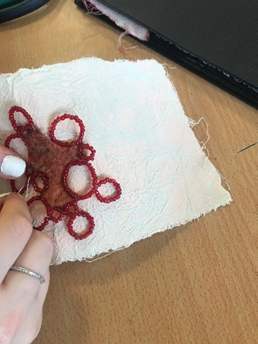
Year 7 – students have created beautiful soft sculptural pieces, that show off the decorative stitching skills they have developed combining techniques such as embroidery stitches, couching, beading and applique.
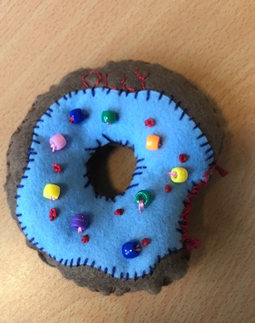 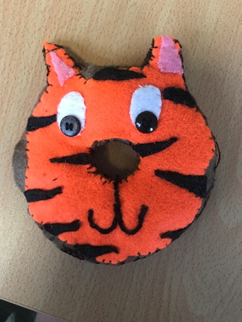
Year 8 – have been working on a cultural patterns project, and have created beautiful design work that will be developed into a fabric place mat and a woven coaster.
 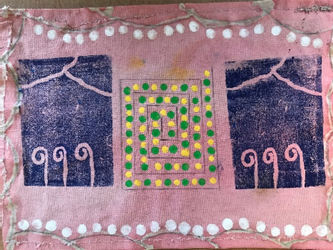
Year 9 – have been working on their final pieces (scarf or tote bags) that bring together their exploration into the work of Jean-Michel Basquiat, Keith Haring, incorporating the theme of New York City
 
Year 10 have been continuing to work on their own personal projects for component 1 (which is worth 60% of their final GCSE grade). They have been researching and creating samples based on their own selected artists to help develop work and ideas.
Year 12 have been busy working on their own individual theme for their component 1 coursework project. They have completed their initial research into their theme and have produced some inspired outcomes based on their first chosen artist. Jasmine Scragg – trialling repeat printing techniques, Meg Clarke – working with different shapes and fabrics in her carefully curated applique pieces.

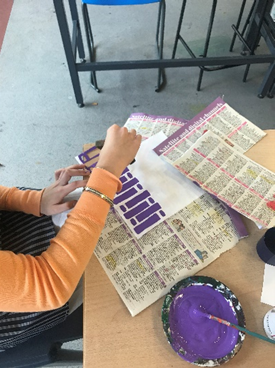 
|
|
|
NLS visits our partner school Anjuman I’Islam Girls High School in Mumbai, India - Sunday 23 March and Saturday 29 March 2025.
We are delighted to share with you details from Mrs Harding of the wonderful trip twelve of our students who visited our partner school in Mumbai.
I had the pleasure of accompanying twelve of our students to visit our partner school in Mumbai, India. We were able to secure £20 000 from the Turing Grant in order to significantly subsidise this trip. We had a fantastic week taking part in lessons, playing sport and learning about single use plastic and AI. Our students really enjoyed working alongside the students from our partner school and learning all about their lives. At our partner school, the school day finishes at 12.30, so after lunch we visited many of the sites in Mumbai including the planetarium, Elephanta caves, Crawford market, the Nehu museum and Prince of Wales museum.
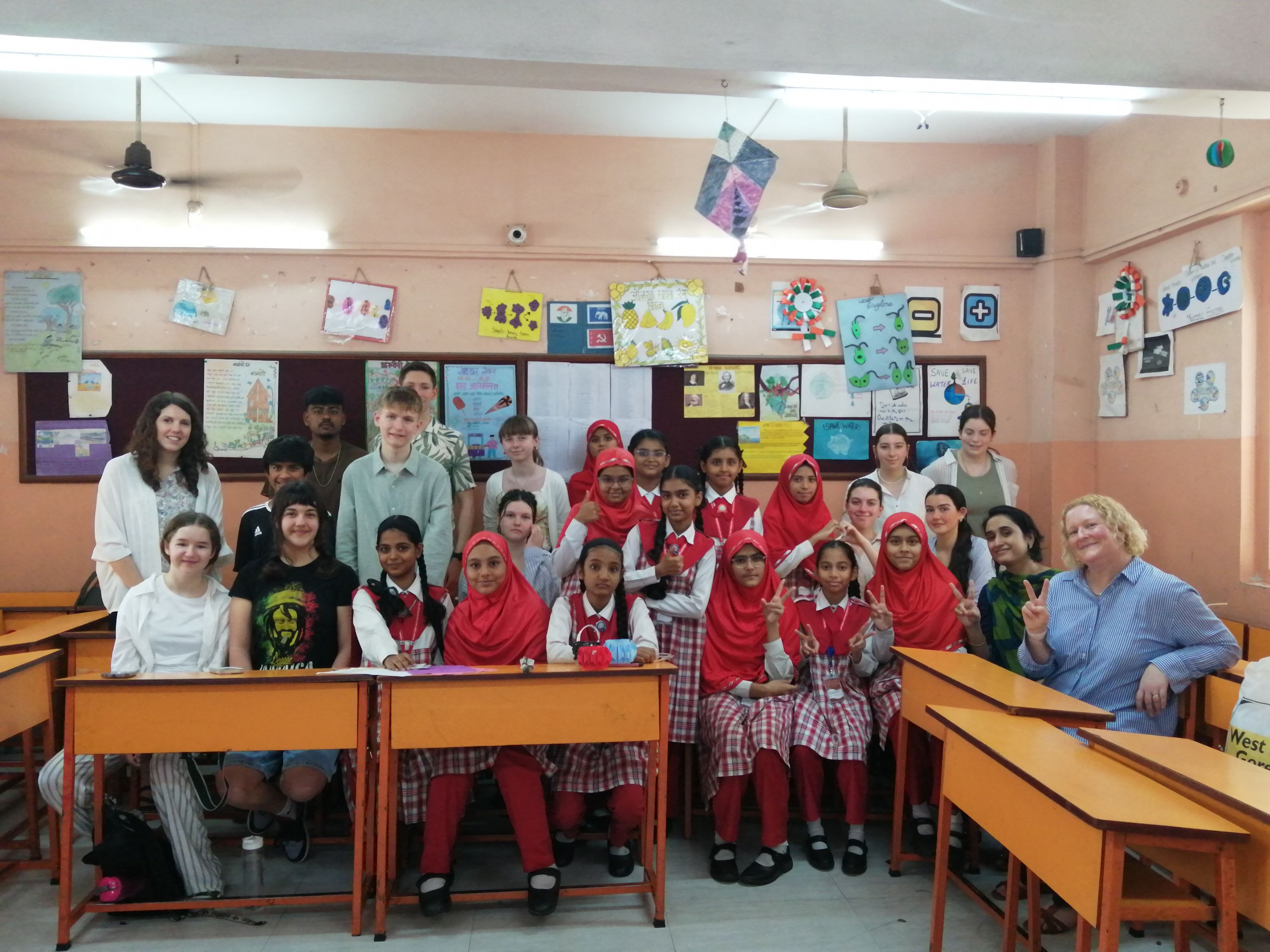

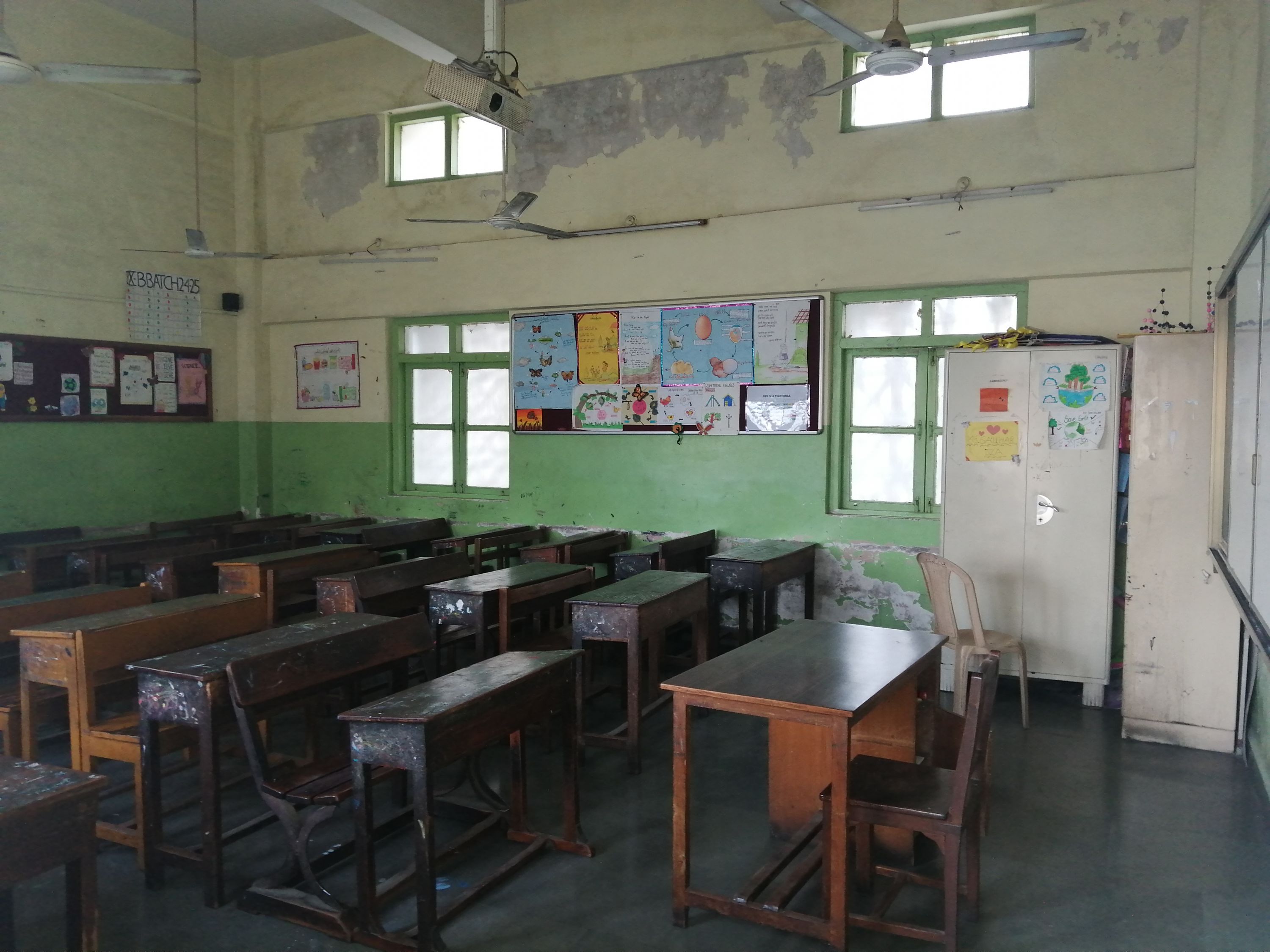
The students had a fantastic time and this is how they described the experience:
“By talking with the girls in the school and working with them collaboratively I developed my skills of communication and teamwork. The girls were so kind and enthusiastic as well as the teachers, I gained insight into their daily life as a student and how different it is to ours, which made me appreciate what I have and the little things we take for granted every day, I was inspired by their love of education which we often lack in this country. Overall, the trip was an amazing experience that helped me grow as a person and learn about cultures, languages, people, history and geography especially about single use plastic, while gaining many useful life skills and unique new experiences along the way.”
“The trip was incredibly informative to me personally. I gained a truly new perspective on the Indian culture and how the students operated within their unique day-to-day lives. The cultural sites we visited such as the Prince of Wales museum helped me learn about the exciting and vivid history of India and the wider Raj. The nature and monuments present on the Elephanta island, which we visited, were breathtaking and made me truly gain an appreciation for both the natural world and the historical and archeological backgrounds to Hinduism. In terms of skills, I learned to be more open and embrace the unique Indian cultures we experienced in terms of cuisine, education and recreation. I also developed my interpersonal skills through talking to the many students at Anjuman Islam school, of which I thoroughly enjoyed! I learnt to be resilient through my enjoyable, but certainly new, adoption of vegetarianism for the duration of the trip and the extensive travelling we undertook all whilst talking to the locals and getting to know each other. The trip was truly an opportunity of a lifetime. It has given me the urge for cultural exploration and global travel as well as being truly informative and thoroughly enjoyable.”
“The trip to Mumbai has altered my perception of everyday life in England. I have built resilience by being in a completely new environment, being exposed to a whole new way of life. I feel inspired to explore new places in my future. This trip has made me realise how grateful I am for my education, the town I live in and my choices. My confidence also grew, I now feel able to speak to people that I have never met with confidence. I felt inspired to jump into every opportunity available”
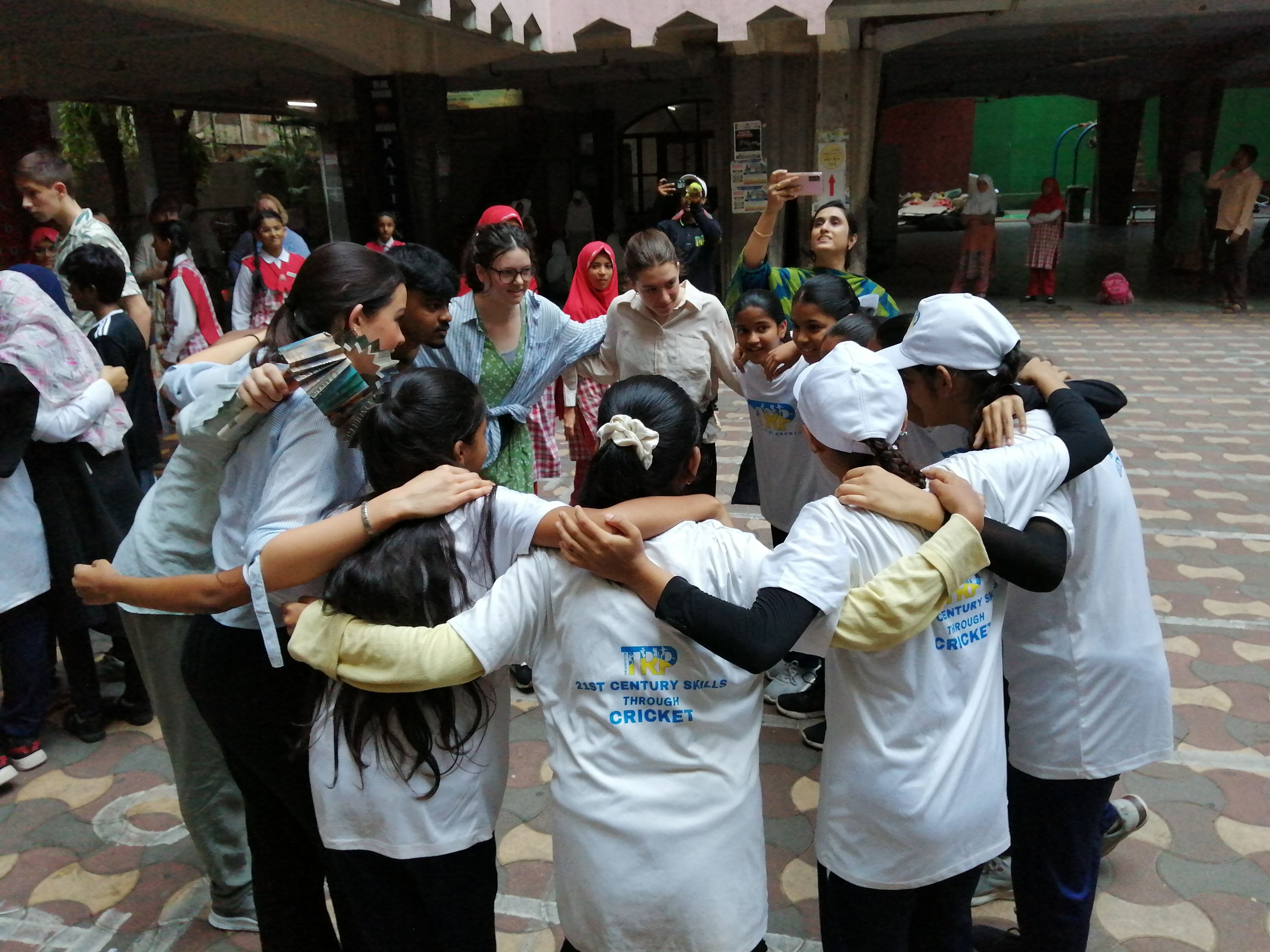
Our students were outstanding ambassadors for NLS. They faced and rose to new challenges, embracing the experience and differences in culture. They have developed their resilience, courage and confidence. I am so proud of all of them!
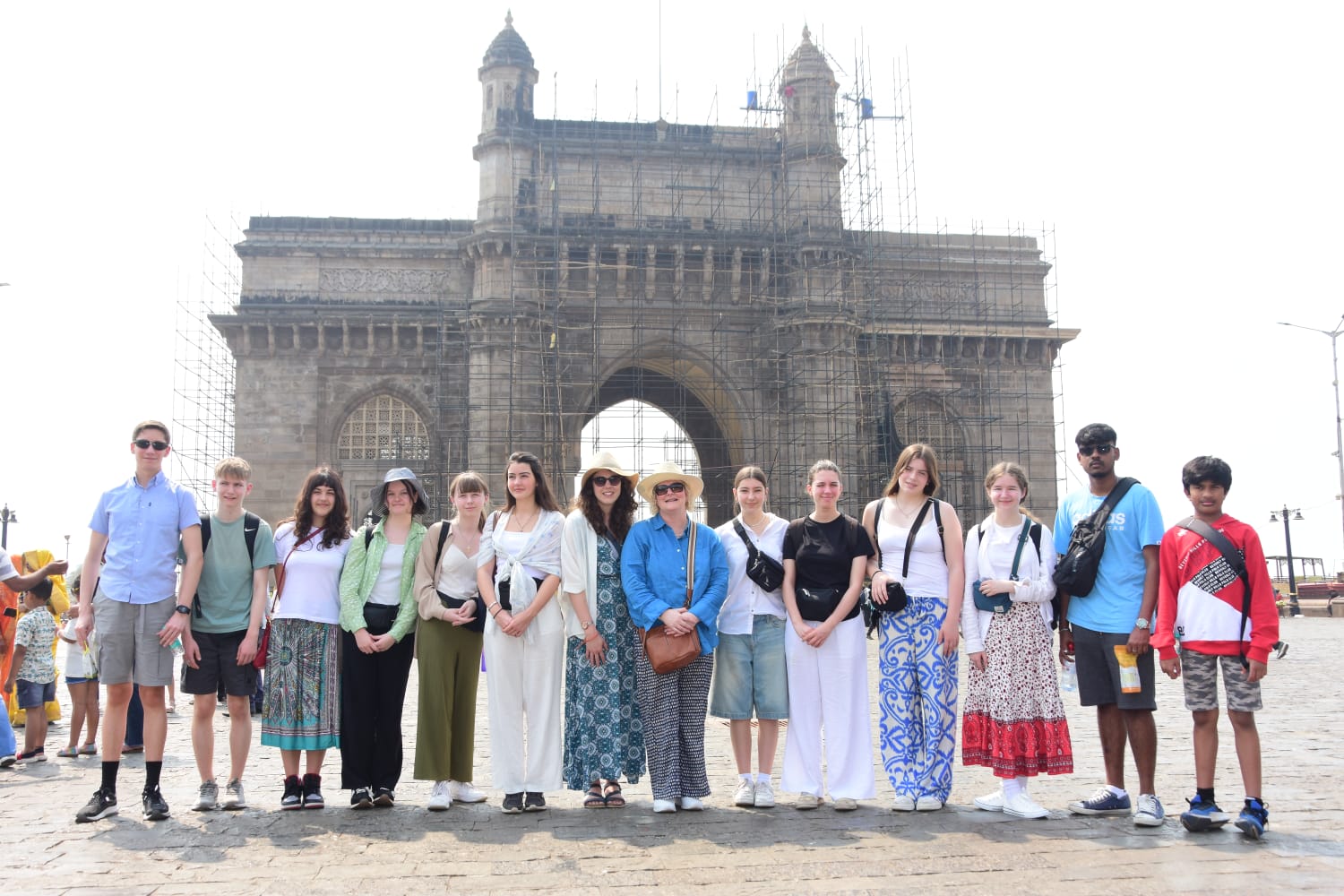
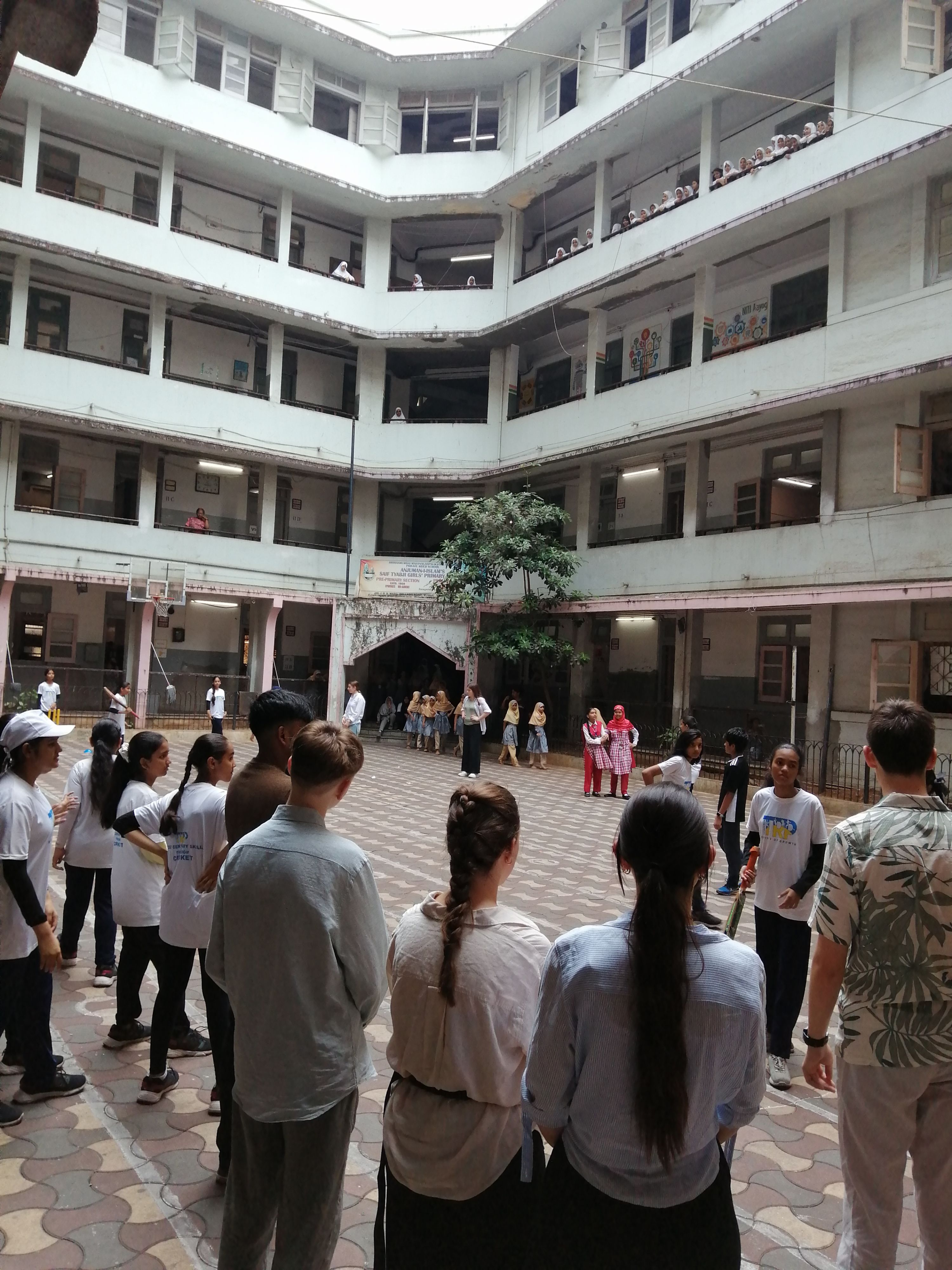
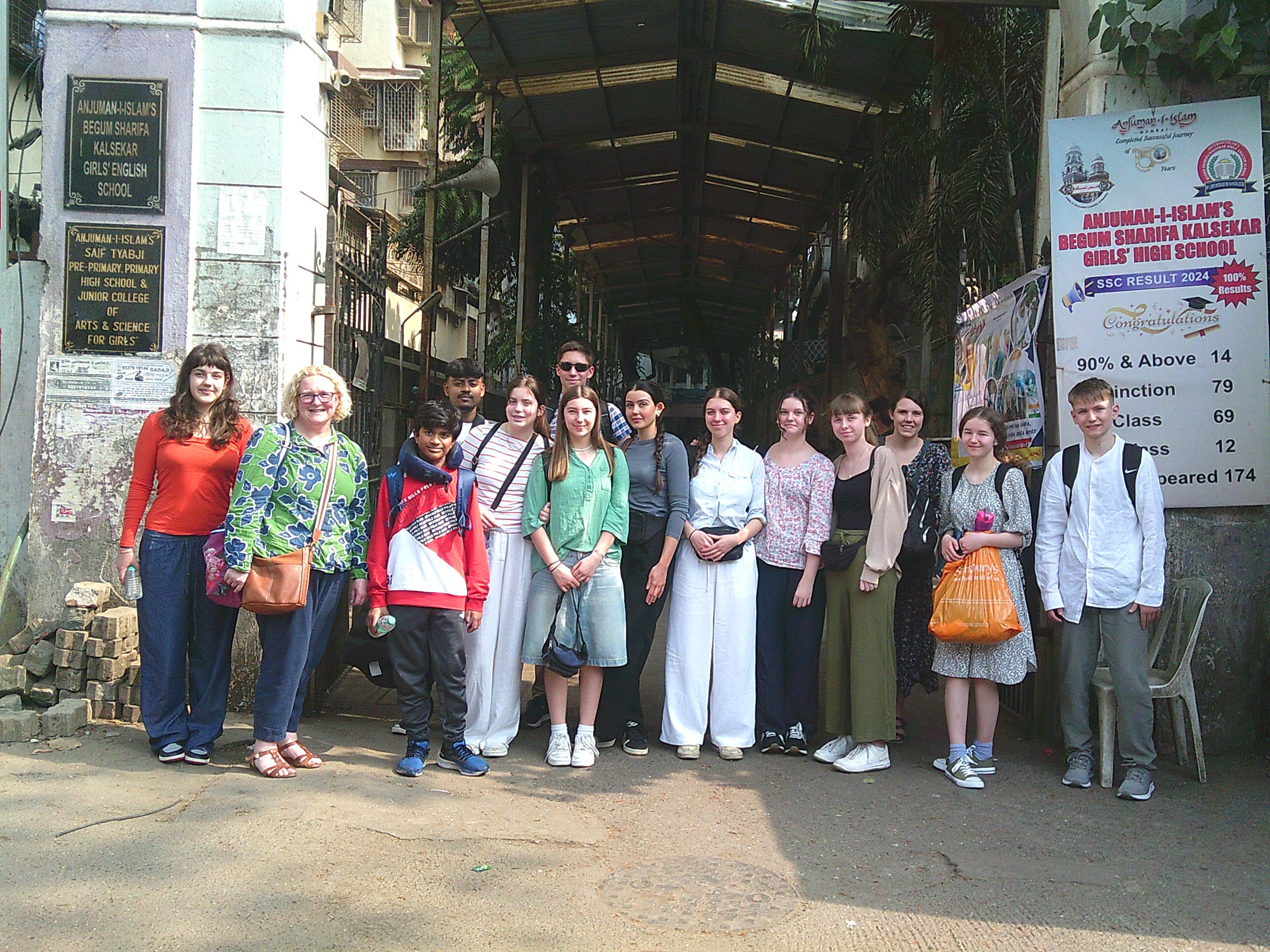
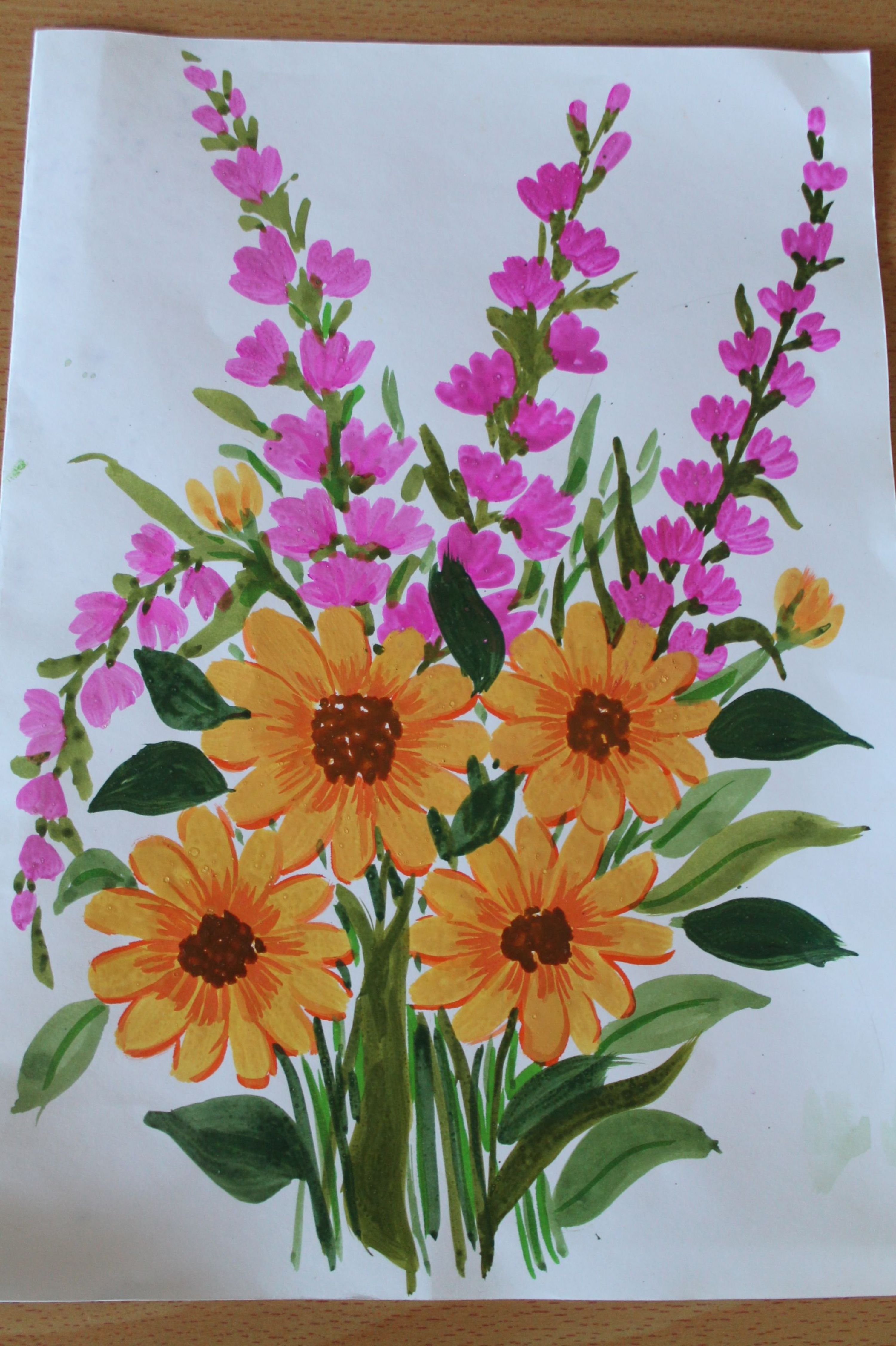
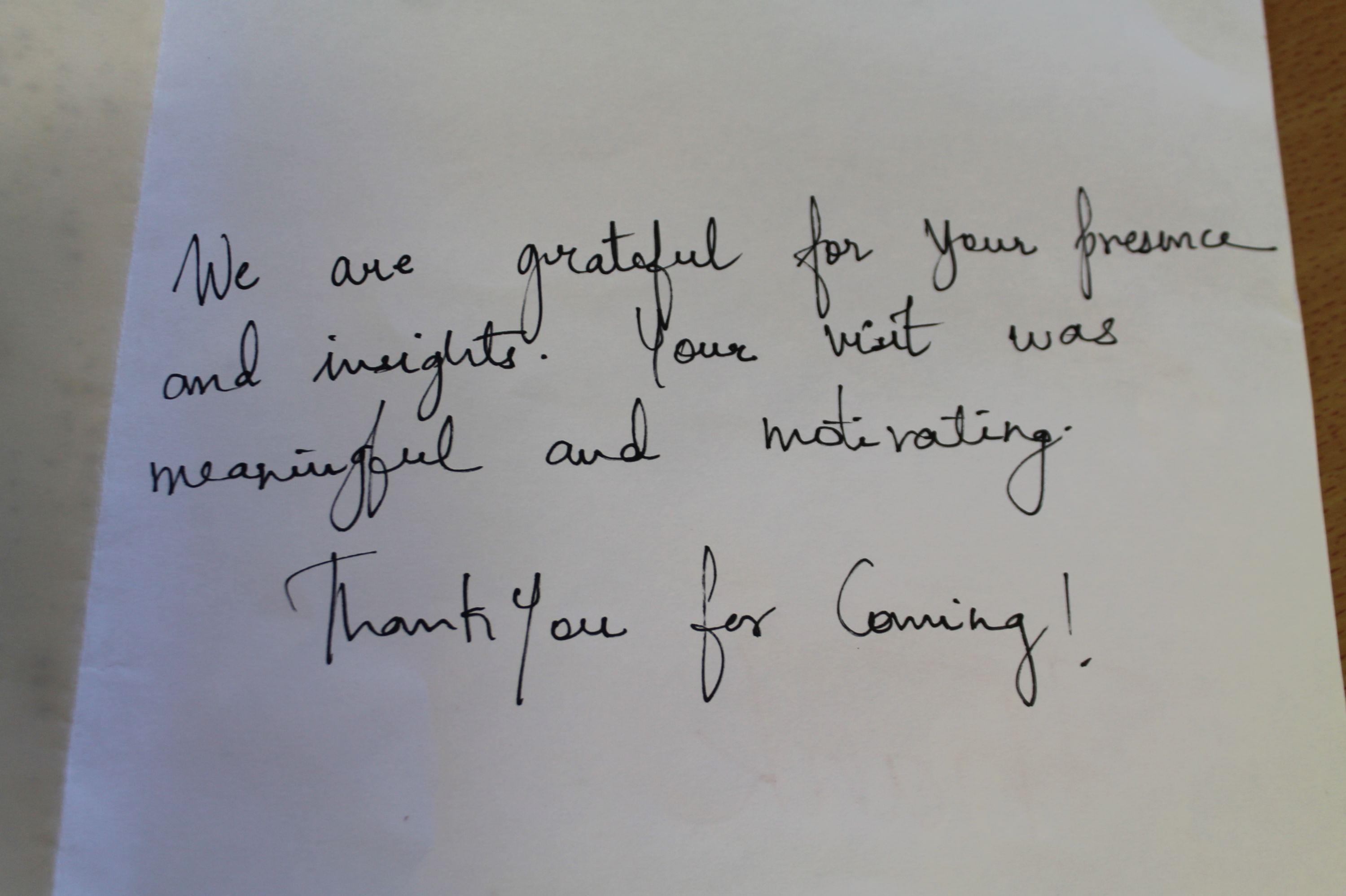

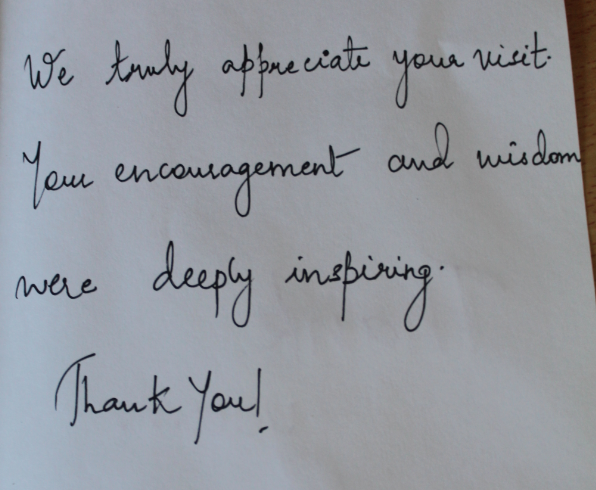
|
|
|
During this term students have taken part in the second Digital Literacy Week of this year. Each year group follows the core Digital Literacy Curriculum as well as additional session on Artificial Intelligence. These sessions across all year groups focused on AI Risks and Safeguarding Actions and followed on from the first session last term where they covered What is AI?’
These sessions included:
- Recap on what AI is
- Key Risks
- How AI Can Manipulate You
- How to Stay Safe and Informed
This involved understanding how AI can impact their privacy, future, and online safety.
- Understand the risks AI presents in education, jobs, and social media.
- Learn how AI is used to manipulate and influence people.
- Know how to protect your digital identity and future career.
Students were challenged to find examples of AI generated content & discussed in groups.
- Is it real or fake?
- What risks might be involved?
- How could you check if it’s true?
Then they looked at The Future of AI – Ethical Use & Responsibility and discussed - How they might change their online habits after today? Sessions also included where to find further help and guidance online and in school.
For Years 7 -9 the week involved:
- Using online versions of Microsoft Word, Powerpoint and Forms which can all be accessed through the Digital Learning Hub and Office 365.
- How to organise your study workspace when working at home. Setting time limits on your devices.
- Learning how to use tech in a sustainable way and being aware of the potential environmental impact that it can have.
- Recognising bad habits around the use of technology.
For Years 10-12 the week involved:
- research and Search Engines
- recognising logos
- How to ask questions into a search engine
- Limit and narrow and then practiced aim to increase accuracy of information and allow for more time
They discussed:
- what is Mindful practice when using IT –
- Ways to help develop your ‘mindful’ technology practice
- how they would you feel about turning off your tech & Challenged to then commit to one
Year 12 also covered using referencing with the aim to help point in the right direction and give tips for formal essays with clear referencing in preparation for those that go to university in writing clear extended pieces of writing they will need to reference all of the sources needed to write it.
They also looked how to add Citations and referencing into a Microsoft WORD document and Tips for using citations and references
Year 13 considered Touch Typing – why, benefits and checked their own speed. Their second session was website design and looked What are the different ways in which creating a website would help you as a student? What different ideas do you have? And included a video to show how to create a website
Again the sessions sparked a lot of great discussions and much to think about.
These are crucial topics in today's digital age, and engaging students in these discussions can empower them to use technology responsibly and effectively. We are also aware that students need to be well-prepared for the challenges and opportunities of the digital world.
|
|
|
March 17-23 was Neurodiversity Celebration Week; this week is about celebrating the strengths and talents of people with non-neurotypical brains.
During assemblies we recognised the wide range of neurological variations in the human brain (ie Attention Deficit Hyperactivity Disorder (ADHD), Autism Spectrum, Dyslexia, Dyspraxia, Dyscalculia and Tourette’s Syndrome and that these brains are not abnormal, just different. Everyone has a differently-wired brain and their own unique way of thinking, interacting and experiencing the world.
 However, we may think differently and have different likes and dislikes, but we are not all neurodiverse. Neurodiversity Celebration Week is one way of reminding everyone of the importance of being tolerant and accepting of everyone. However, we may think differently and have different likes and dislikes, but we are not all neurodiverse. Neurodiversity Celebration Week is one way of reminding everyone of the importance of being tolerant and accepting of everyone.
Our digital screens around school also displayed information including celebrities and famous people students may know who are autistic, dyslexic or have ADHD, tourettes etc.
NLS Young Carers
March 13 was Young Carers Action Day and this year's theme ‘Give me a Break’, focused on ensuring young carers have sufficient time to themselves to learn, develop and have fun.
Here at NLS we spent some time discussing how our Young Carers relax, we took a break on the Astro to play football and engaged in some craft activities. Our year 11 Young Carers were invited to unwind with cakes and a catch up with Tracey Beasley , Warwickshire Young Carers Co-ordinator for advice on careers, emotional wellbeing and practical support
During half term there is an exciting opportunity one for our Year 11 Young Carers to attend a three- day taster residential trip at Bangor University. Raising aspirations for Young Carers and offering the opportunity to find out about University life, attend lectures and Post 16 support available from Warwickshire Young Carers and Caring Together Warwickshire.
 

|
|
|
At NLS, we utilise the schemes of learning and opportunities that the King's Trust offers to enable some of our most vulnerable pupils to achieve. Students in Year 10 have completed modules on Managing Money, Teamwork and another on Sustainability so far. They will be building bird boxes which we plan to install in the school grounds. Our Year 11 students have been working on their units for three years now (with many completing six units) and are on track to achieve the Level 1 Certificate at the end of their Year 11 – recently completing modules in Careers and Well-Being.
 If any students have any outstanding work that has not been entered into their folder, please ask them to submit it, either to me at the address below or to their teacher for King's Trust. If any students have any outstanding work that has not been entered into their folder, please ask them to submit it, either to me at the address below or to their teacher for King's Trust.
If you wish to have any more information about The King's Trust, please contact jbarrett@northleamington.co.uk
|
|
|
We have a range of Extra-Curricular clubs available and details can be found on the website and also on the digital screens around school.
Year 7 and 8 students, who are part of a Reading Group run by Library staff after school, attended an Award Ceremony at King's High School for the Warwickshire Schools Library Service Book Awards, WSBA 2025 on 2 April.
As part of the Reading Group the students have been reading six books, choosing their top three books, which culminated in the award ceremony where they met four of the six authors, and were able to have books signed by the authors.
The authors at the ceremony were
- Tom Percival - The Wrong Shoes
- Alistair Chisholm - I am Wolf
- S.J. Willis - Bite Risk
- Dev Kothari- Bringing back Kay-Kay
They all gave really interesting short talks about the book they had written and then answered questions from students. There was also a video from one of the authors who wasn't able to attend in person, Jeffrey Boakye, who wrote Kofi and the Rap battle Summer.
The book that received the most votes from the 16 Warwickshire Secondary schools who took part in the book awards was Quiet Storm by Kimberly Whittam.
Our NLS reading groups favourite was Bite Risk by S.J Willis.
The Warwickshire Young Poet Laureate, Ananditha Venkatramanan, read two poems, an inspiration to those students who love poetry.
The Award is aimed at Years 7 and 8 and the books have all been chosen to appeal to a range of readers and abilities. We hope they have inspired our students to become even keener readers and introduce them to some new books and authors!
We had a lovely morning at the award ceremony and it was a great event for our students to be part of.

Our Year 7 Science Club recently took on the Egg Drop Challenge, testing their engineering and problem-solving skills! Using a variety of materials, they designed protective structures to keep their eggs safe when dropped from two floors high.
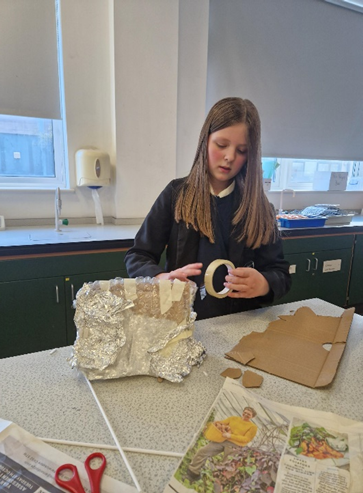 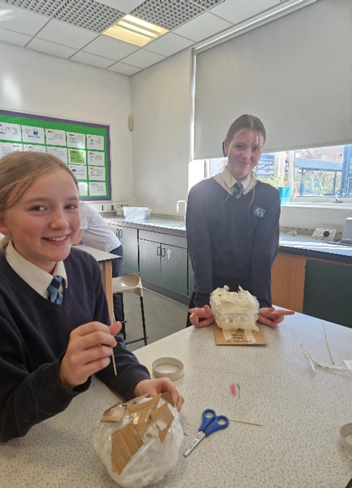 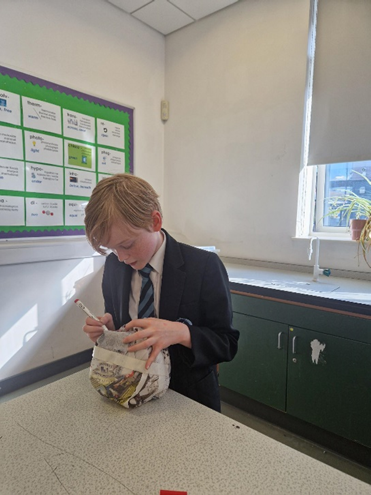
Through teamwork, creativity, and a little bit of physics, many of the eggs survived the fall without a single crack!
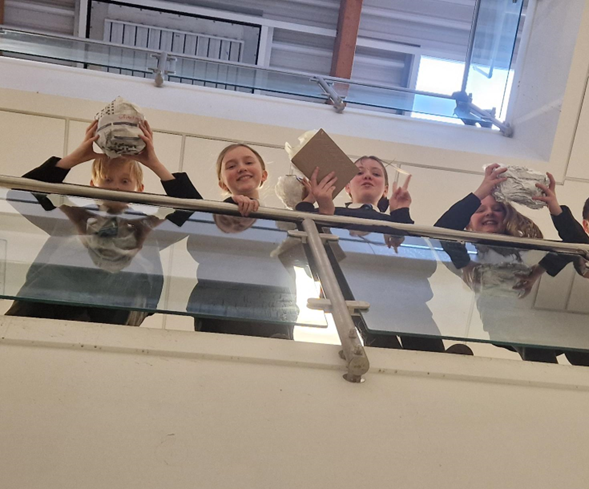
It was a fantastic way for students to explore forces, air resistance, and impact in a fun, hands-on experiment. Well done to all our young scientists!
|
|
|
 Students in Year 12 who are undertaking the Gold Award have also been completing their Skills, Volunteering and Physical sections since the start of the academic year. Students in Year 12 who are undertaking the Gold Award have also been completing their Skills, Volunteering and Physical sections since the start of the academic year.
Training has been taking place every Wednesday since the start of the academic year and our expedition dates are as follows:
On 6 March, Gold students went on a training day to White Peak in Derbyshire where they learned navigation, orienteering and map reading skills. Below are some photos from the trip.
From Thursday 27 March to Saturday 29 March, they undertook their Practice Expedition. This was tough with some challenging terrain offered by the Brecon Beacons and The Black Mountains of South Wales. We were blessed by the weather though and, other than a very few drops, the expedition remained rain free (an unusual thing for a DofE expedition at NLS). Students camped and cooked and remained resilient and upbeat throughout, despite the terrain and completed the practice with returning home on the Saturday tired but triumphant.
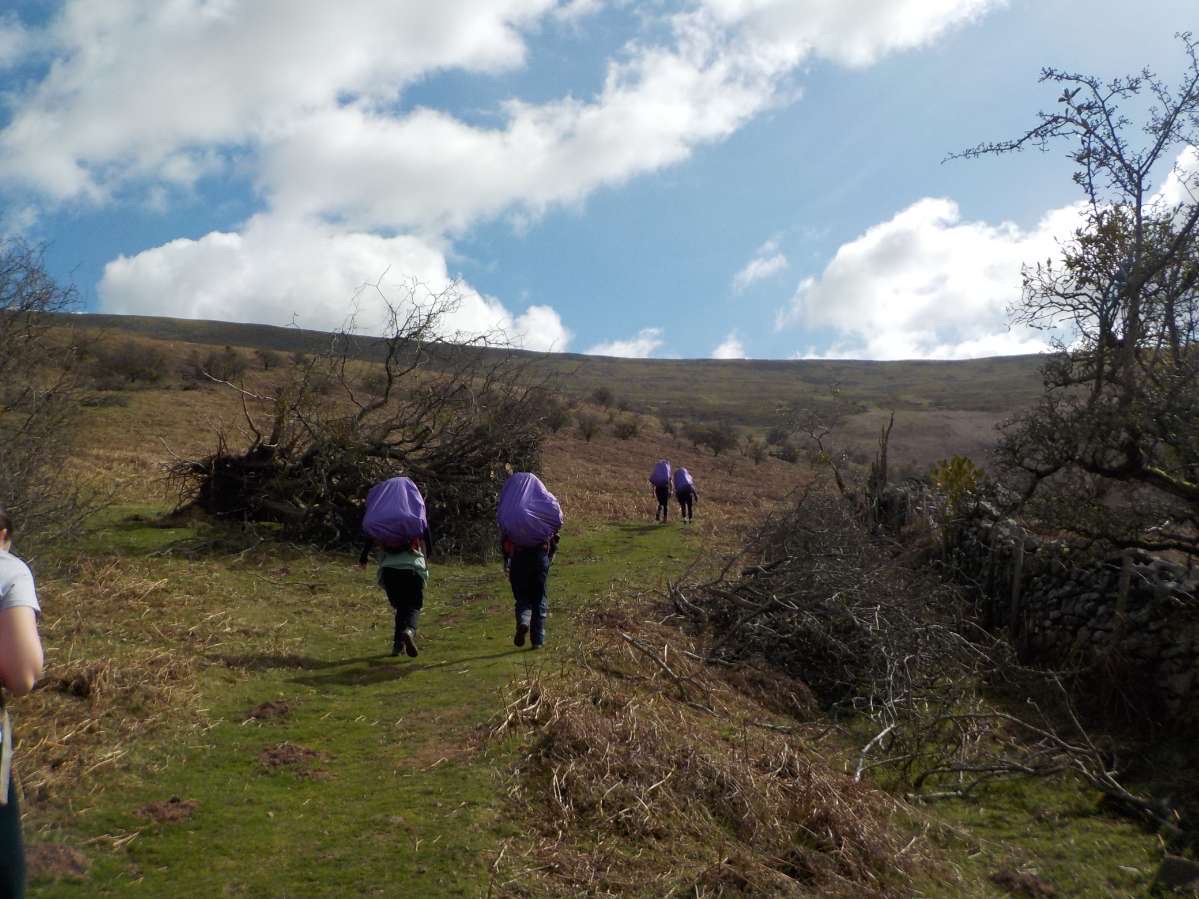

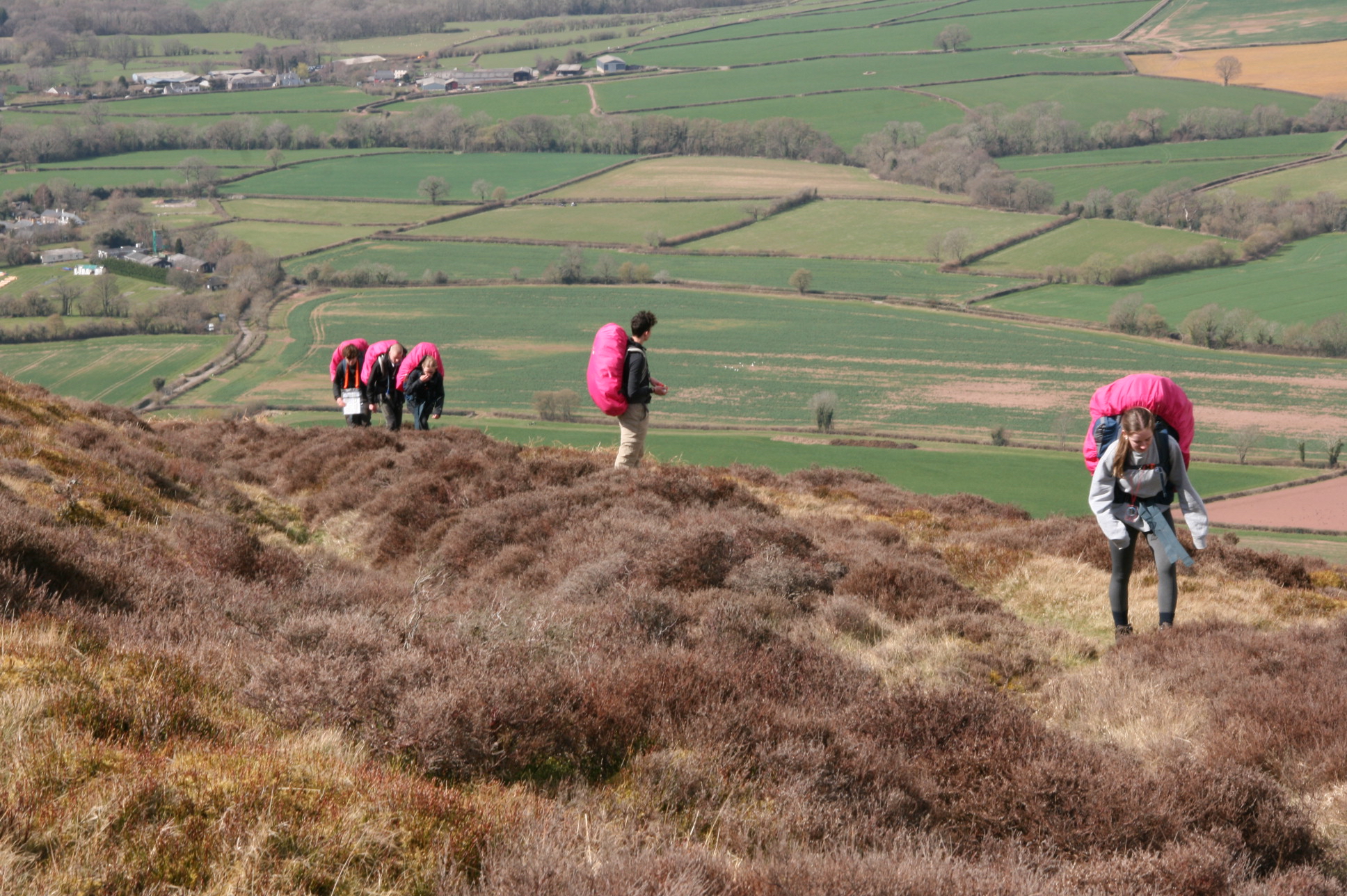

Students in Year 10 who are undertaking the Silver Award have also been completing their Skills, Volunteering and Physical sections since the start of the academic year.
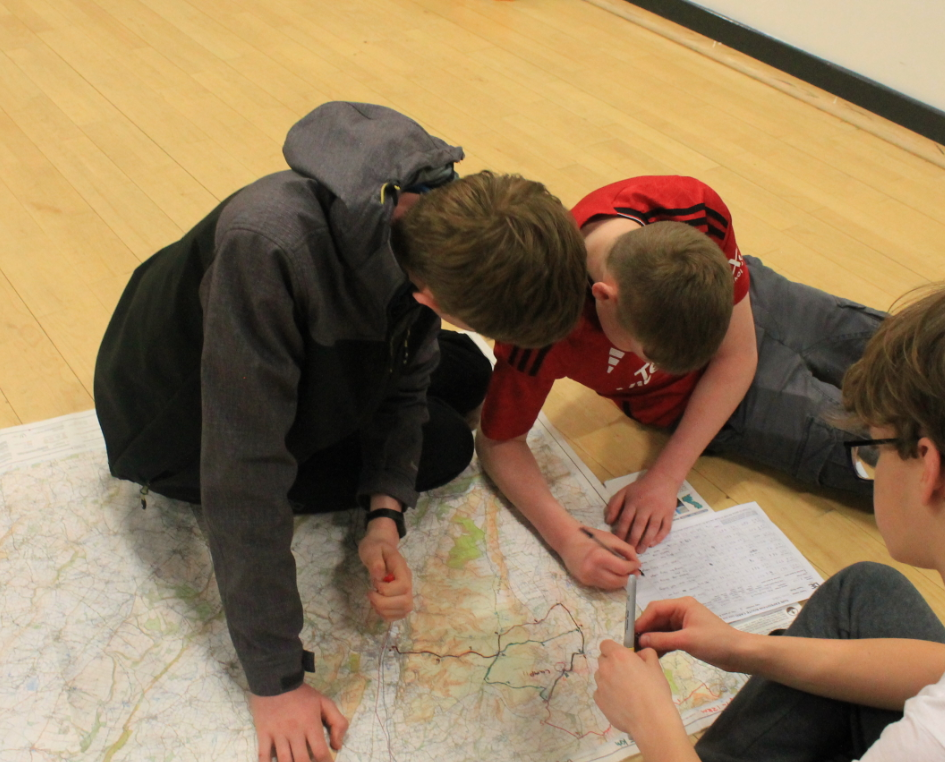 Training for the Silver Award took place in March and students learned all the vital skills they need for when they undertake their practice and qualifying expeditions from tent set-up and campcraft to basic first aid; how to cook, what food to bring, the importance of hydration, choosing the right clothing and obeying the countryside code were all included in their training. Training for the Silver Award took place in March and students learned all the vital skills they need for when they undertake their practice and qualifying expeditions from tent set-up and campcraft to basic first aid; how to cook, what food to bring, the importance of hydration, choosing the right clothing and obeying the countryside code were all included in their training.
They also planned, drew out their routes and completed route cards for their qualifying expedition to The Shropshire Hills in July.

Students in Year 9 who are undertaking the Bronze Award have been completing their Skills, Volunteering and Physical sections since the start of the academic year and many are coming to the end of at least one of these.
Training for the Bronze Award took place last weekend with students camping over on the school grounds. It was a wonderful weekend where students learned all of the invaluable skills they will need when they complete their Bronze Qualifier in July.
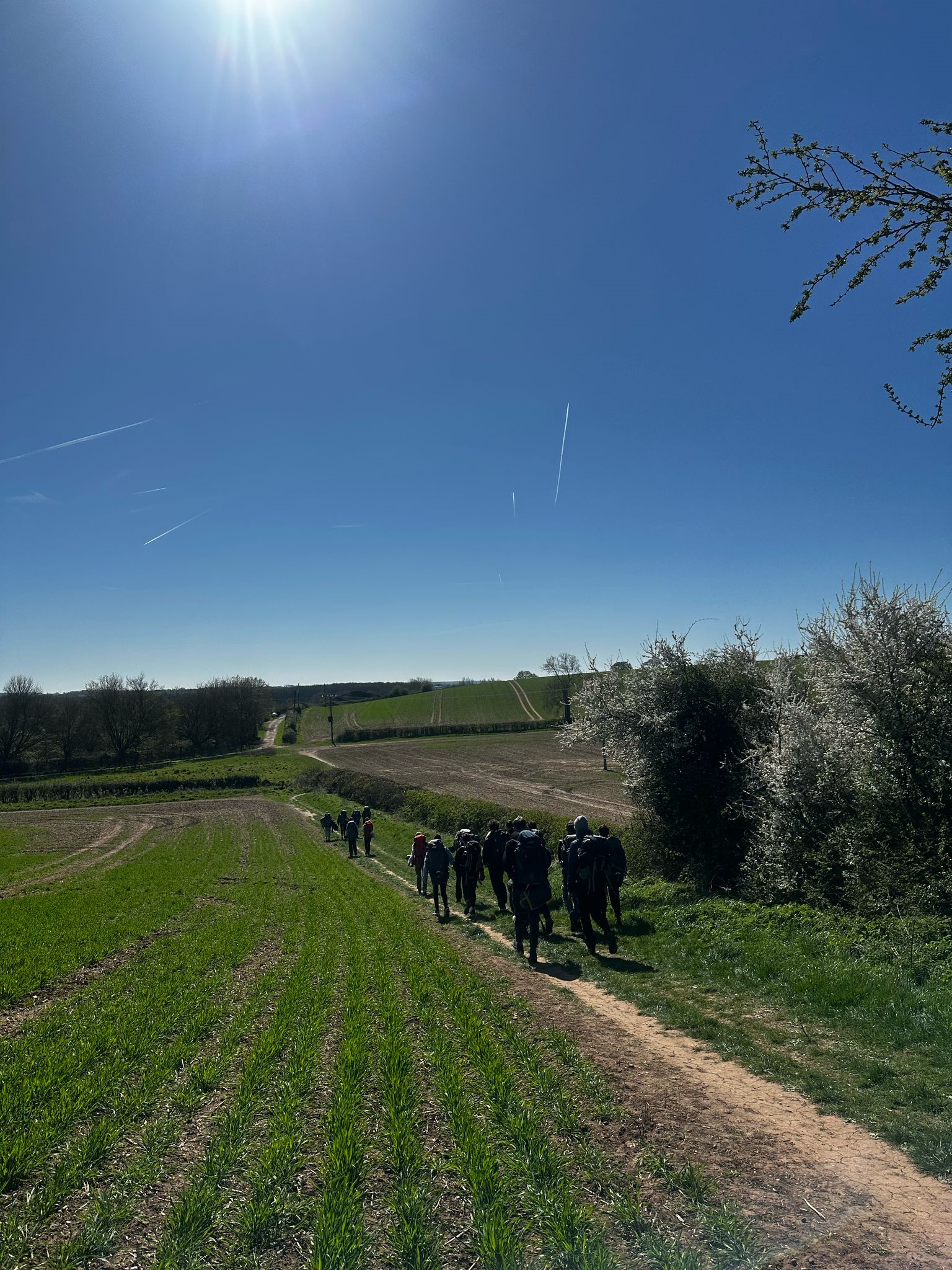 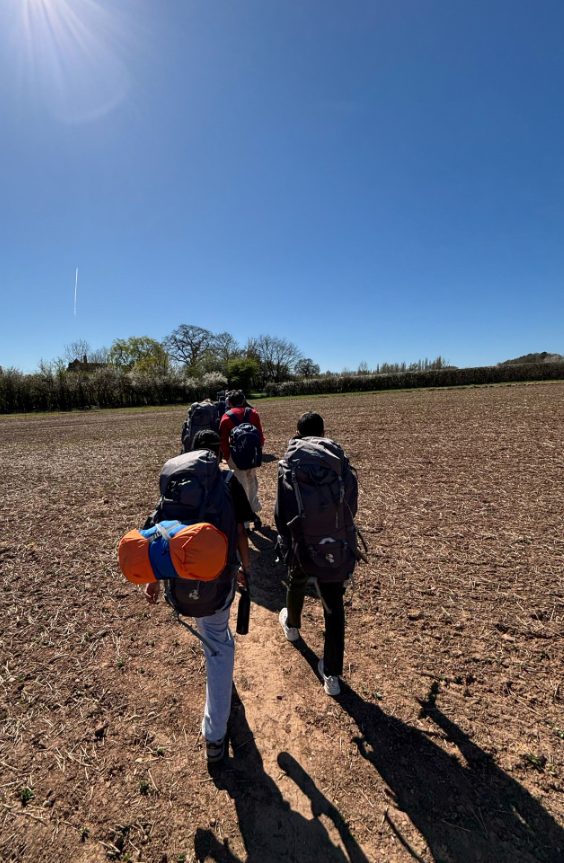
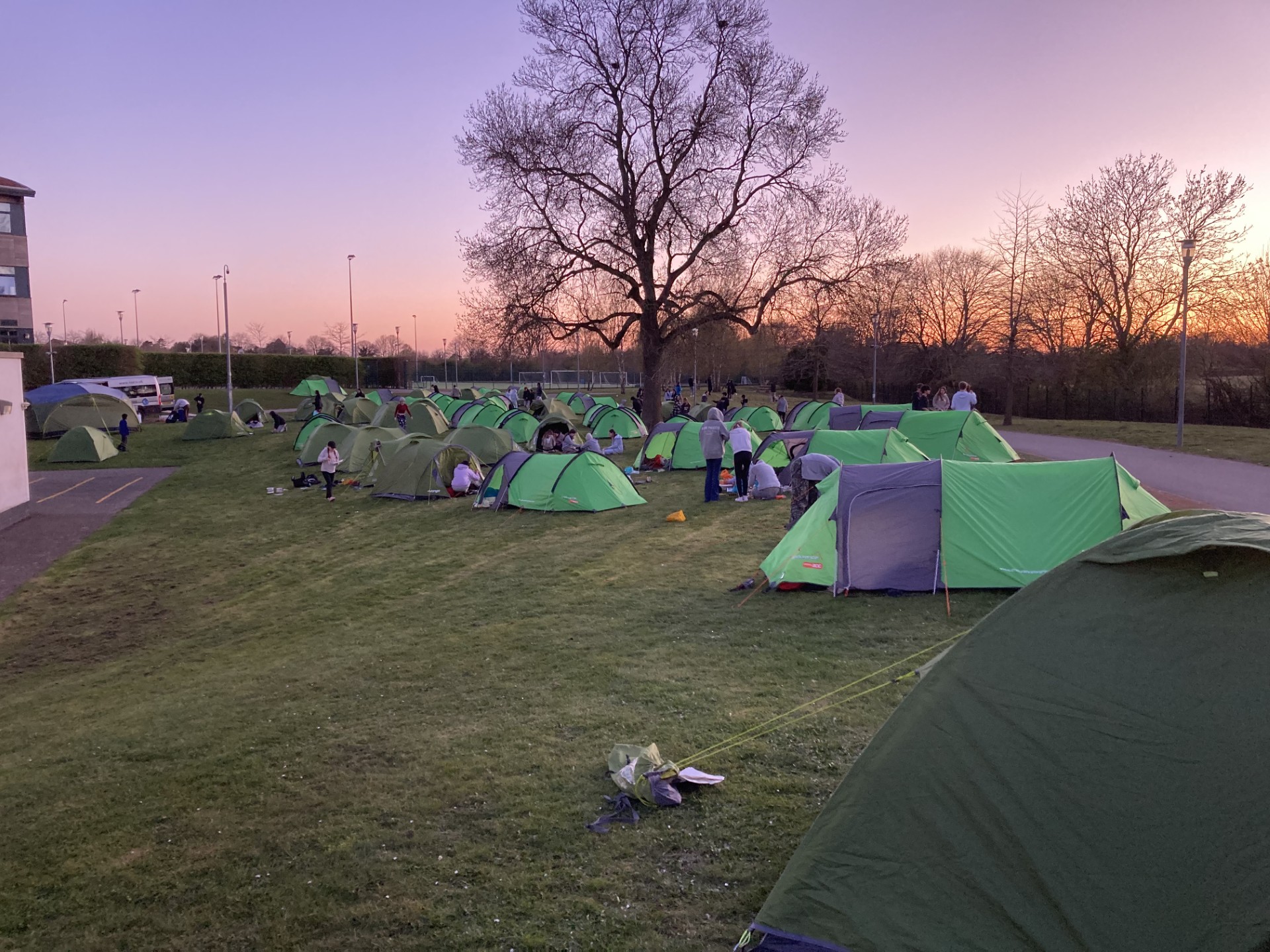
If you wish to have any more information about The Duke of Edinburgh’s Award, please contact jbarrett@northleamignton.co.uk and more information can be found on our WEBSITE LINK
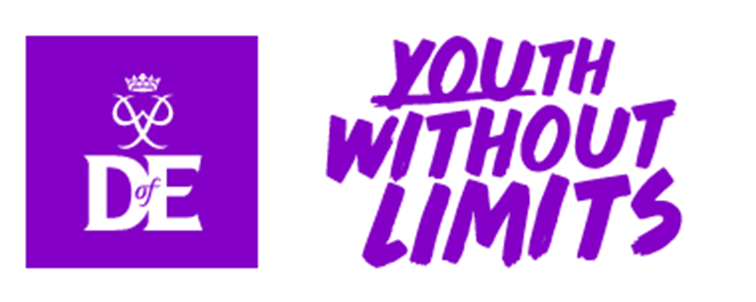
|
|
|
|
|
|